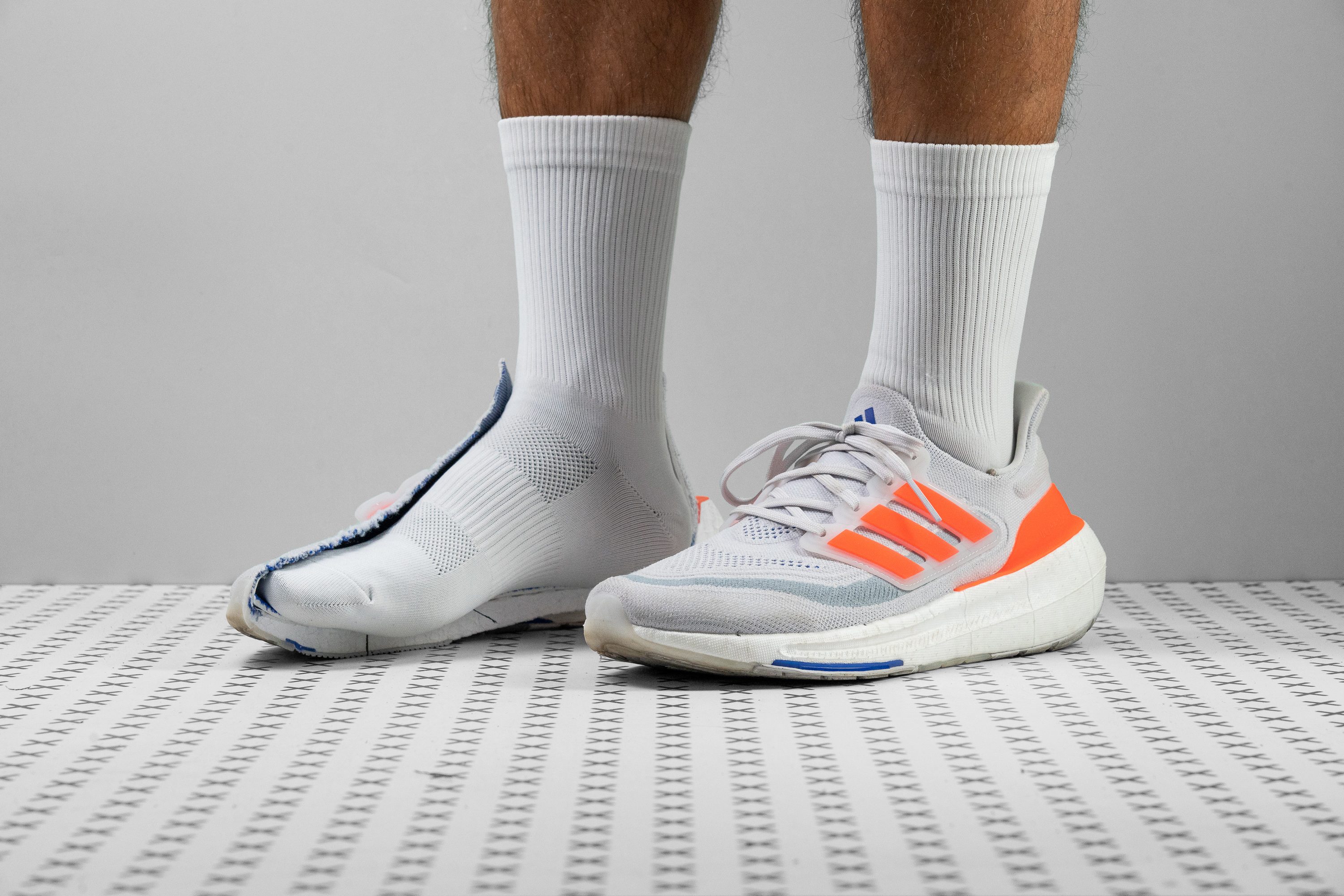Our verdict
- Top pick in best Adidas running shoes (2023)
Pros
- Ideal for heel strikers
- Suitable for wide feet
- Effective stability elements for mild pronation
- Snug and secure lockdown
- Durable toebox and heel
- Outsole built to last
- Ready for winter runs
- Works as a comfy walking shoe
- Sustainably designed upper
Cons
- Thin forefoot cushioning
- Could be lighter
- Not for speedwork
- Average at best breathability
Audience verdict
- Top 27% in running shoes for walking
- Top 30% in daily running shoes
Comparison
The most similar running shoes compared
+ + Add a shoe | |||||
|---|---|---|---|---|---|
| Audience score | 89 Great! | 90 Superb! | 84 Good! | 81 Good! | |
| Price | $190 | $180 | $75 | $100 | |
| Pace | Daily running | Daily running | Daily running | Daily running | |
| Shock absorption | Moderate | Moderate | - | - | |
| Energy return | High | High | - | - | |
| Traction | High | High | - | - | |
| Arch support | Neutral | Neutral | Neutral | Neutral | |
| Weight lab Weight brand | 10.8 oz / 305g 10.5 oz / 299g | 10.3 oz / 292g 11.4 oz / 323g | 11.2 oz / 318g 10.1 oz / 285g | 9.7 oz / 274g 10 oz / 283g | |
| Drop lab Drop brand | 11.9 mm 10.0 mm | 10.6 mm 10.0 mm | 12.9 mm 8.0 mm | 12.5 mm 9.0 mm | |
| Strike pattern | Heel | Heel | Heel | Heel | |
| Size | Half size small | True to size | True to size | True to size | |
| Midsole softness | Soft | Soft | Balanced | Balanced | |
| Difference in midsole softness in cold | Normal | Small | Normal | Small | |
| Toebox durability | Good | Decent | Bad | Good | |
| Heel padding durability | Good | Good | Bad | Good | |
| Outsole durability | Good | Good | Decent | Bad | |
| Breathability | Moderate | Breathable | Moderate | Breathable | |
| Width / fit | Medium | Wide | Medium | Medium | |
| Toebox width | Wide | Wide | Medium | Medium | |
| Stiffness | Moderate | Stiff | Moderate | Stiff | |
| Torsional rigidity | Moderate | Stiff | Moderate | Moderate | |
| Heel counter stiffness | Moderate | Moderate | Flexible | Moderate | |
| Heel lab Heel brand | 30.1 mm 30.0 mm | 35.2 mm 39.0 mm | 31.9 mm 34.0 mm | 30.7 mm 25.0 mm | |
| Forefoot lab Forefoot brand | 18.2 mm 20.0 mm | 24.6 mm 29.0 mm | 19.0 mm 26.0 mm | 18.2 mm 16.0 mm | |
| Widths available | Normal | Normal | NormalWide | Normal | |
| Orthotic friendly | ✓ | ✓ | ✓ | ✓ | |
| Season | All seasons | SummerAll seasons | All seasons | SummerAll seasons | |
| Removable insole | ✓ | ✓ | ✓ | ✓ | |
| Ranking | #218 Top 32% | #52 Top 14% | #248 Bottom 35% | #303 Bottom 20% | |
| Popularity | #296 Top 44% | #199 Bottom 48% | #325 Bottom 15% | #318 Bottom 16% |
Who should buy
We recommend the Ultraboost Light to:
- Casual runners who want a stable neutral road shoe
- Heel strikers looking for added rearfoot protection
- Runner who enjoy long distance efforts
- Those looking for a daily runner that doubles as a comfy sneaker
- Runners with mildly pronating strides
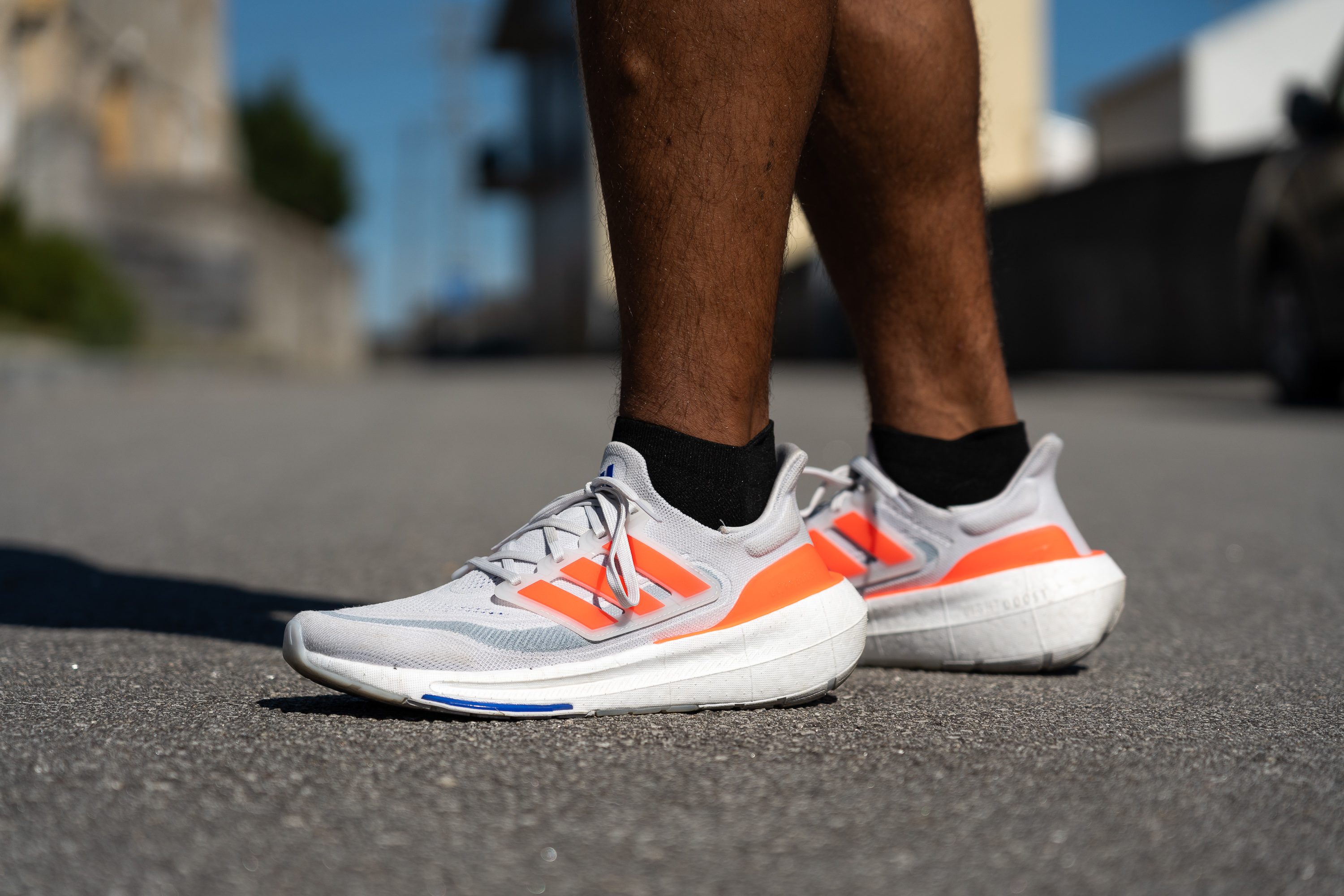
Who should NOT buy
While heel-strikers have plenty of plush foam to land on, the midsole provides much less cushioning at the forefoot, so mid/forefoot striking runners will find the shoe to feel much more firm underfoot. We recommend the ASICS Gel Nimbus 25 as an alternative that's well cushioned throughout.
Contrary to what the name suggests, the Ultraboost Light is relatively heavy. While this isn’t an issue for short to mid-distance runs, the shoe did prove quite burdensome during the latter half of our longer test runs.
The sock-like fit of the Ultraboost Light lends the shoe a comfy lockdown that’s secure enough for most purposes. It’s only when we picked up the pace that we began to notice some foot movement within the shoe that brought on some uncomfortable hot spots. For a daily trainer that sports a more snug, racer-like fit, we recommend the Brooks Levitate 6.
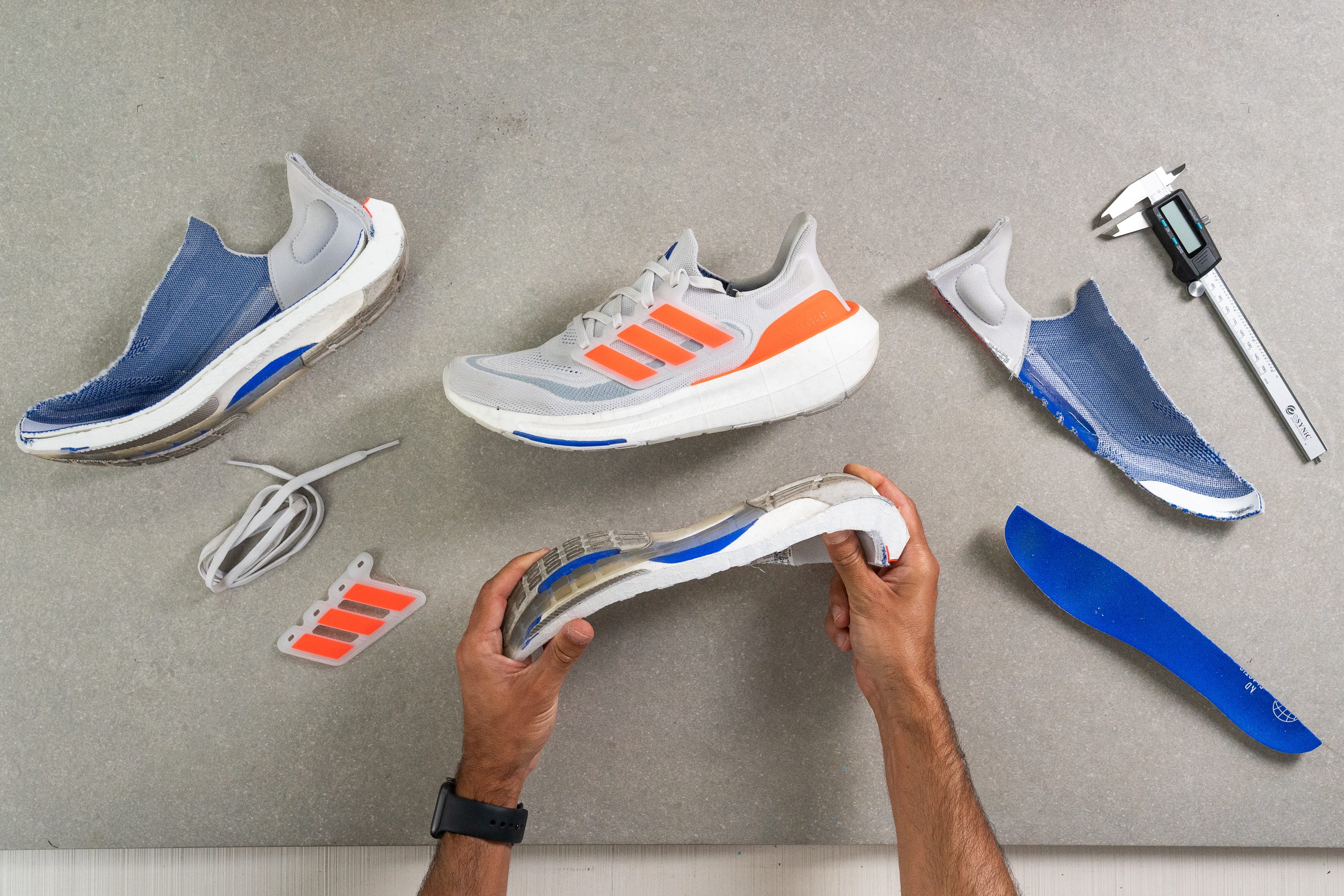
Cushioning
Shock absorption
While heel cushioning lands near the average at 122 SA, we discovered a surprisingly low 78 SA in the forefoot. In simple terms—if you strike up front, you’d better like ground feel, because you'll get a ton of it.
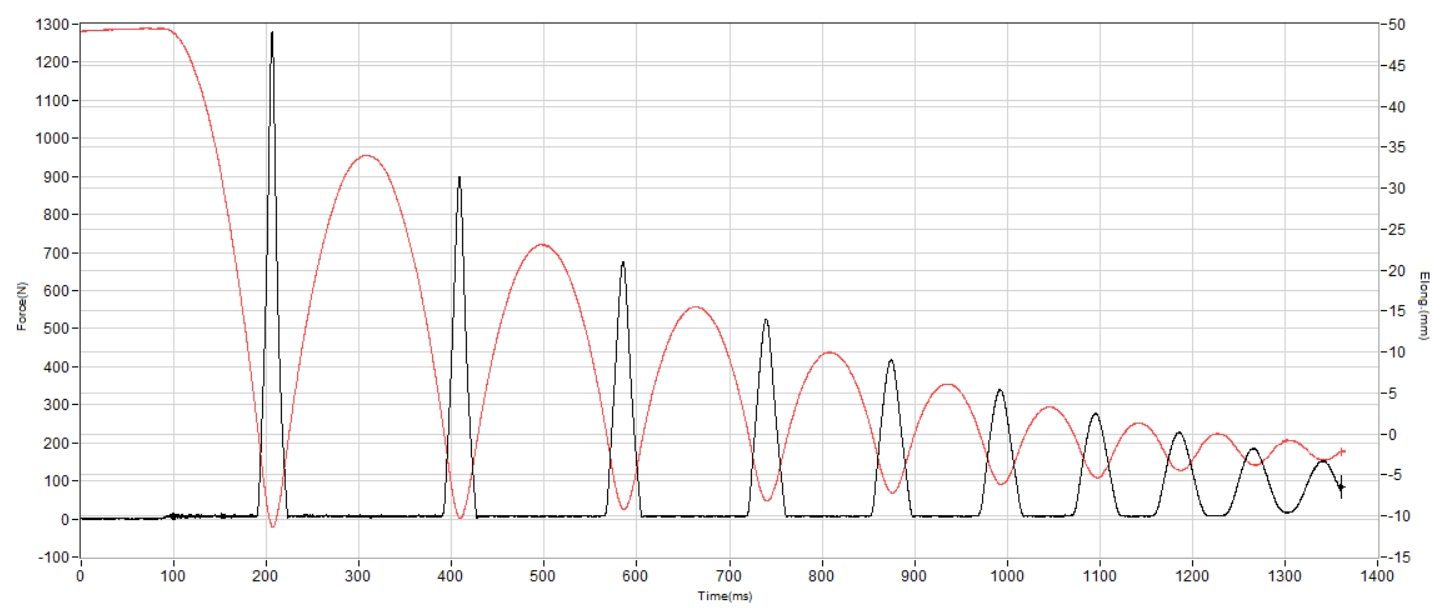
| Ultraboost Light | 122 SA |
| Average | 130 SA |
Energy return
One of the most surprising things about Light Boost is how it manages to shave a lot of weight without sacrificing bounce. We tested this foam in the lab and found 66.7% energy return in the heel and a jaw-dropping 70.5% in the forefoot. Well, that's seriously impressive!
| Ultraboost Light | 66.7% |
| Average | 58.6% |
Heel stack
We measured the prominent heel stack of the Ultraboost Light to be 30.1 mm which is almost exactly as advertised by Adidas. While this makes the shoe’s stack ever-so slightly shorter than our lab average, heel strikers will have more than enough cushioning underfoot for a protective and comfortable ride.
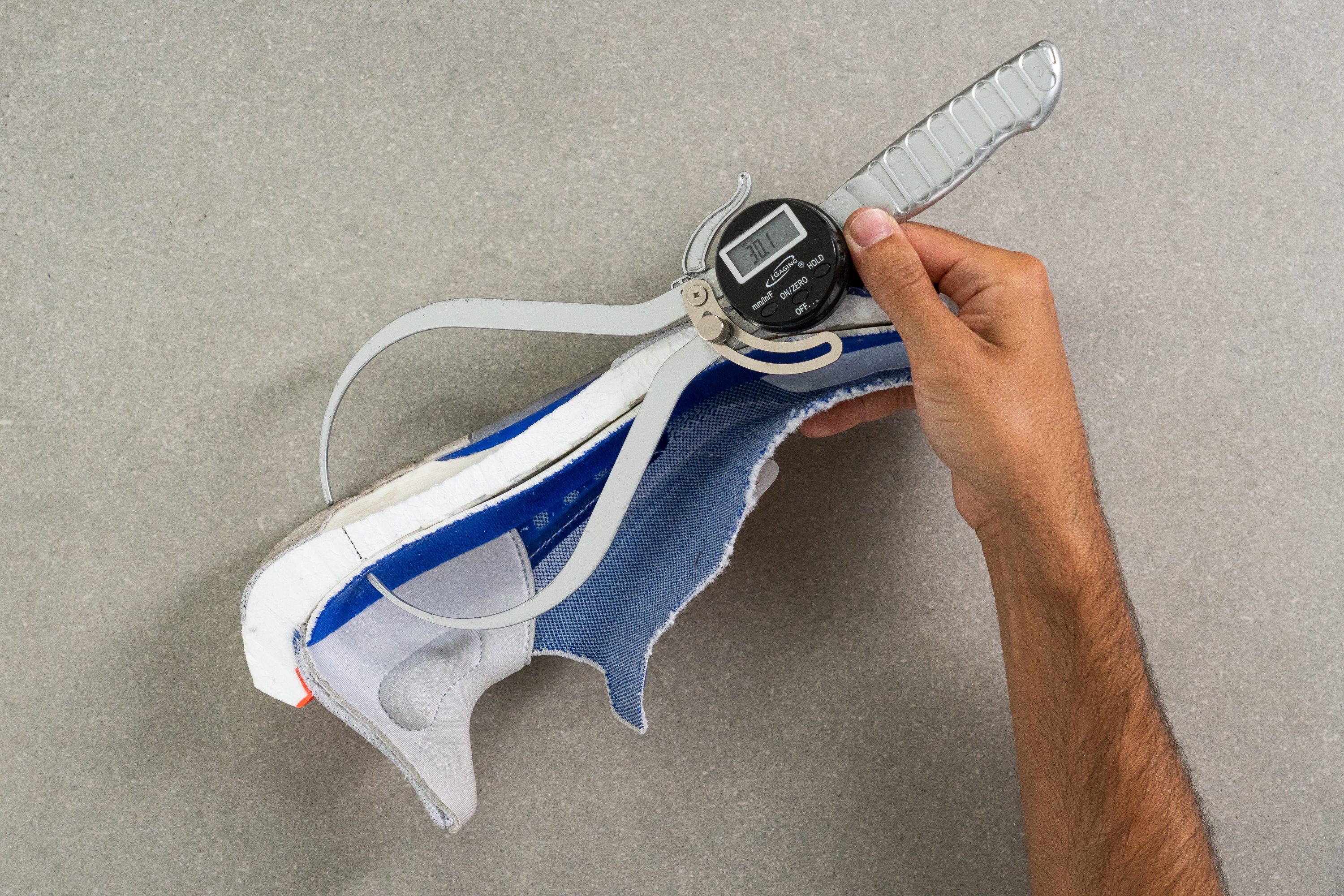
| Ultraboost Light | 30.1 mm |
| Average | 34.8 mm |
Forefoot stack
With a forefoot stack measuring 21.7 mm according to our caliper, the Ultraboost Light is only 1.7 mm taller than officially stated by Adidas, and also falls just shy of our current lab average. While this stack height gives forefoot strikers a good amount of ground-feel, it does come at the expense of impact protection, which feels inadequate for longer runs.
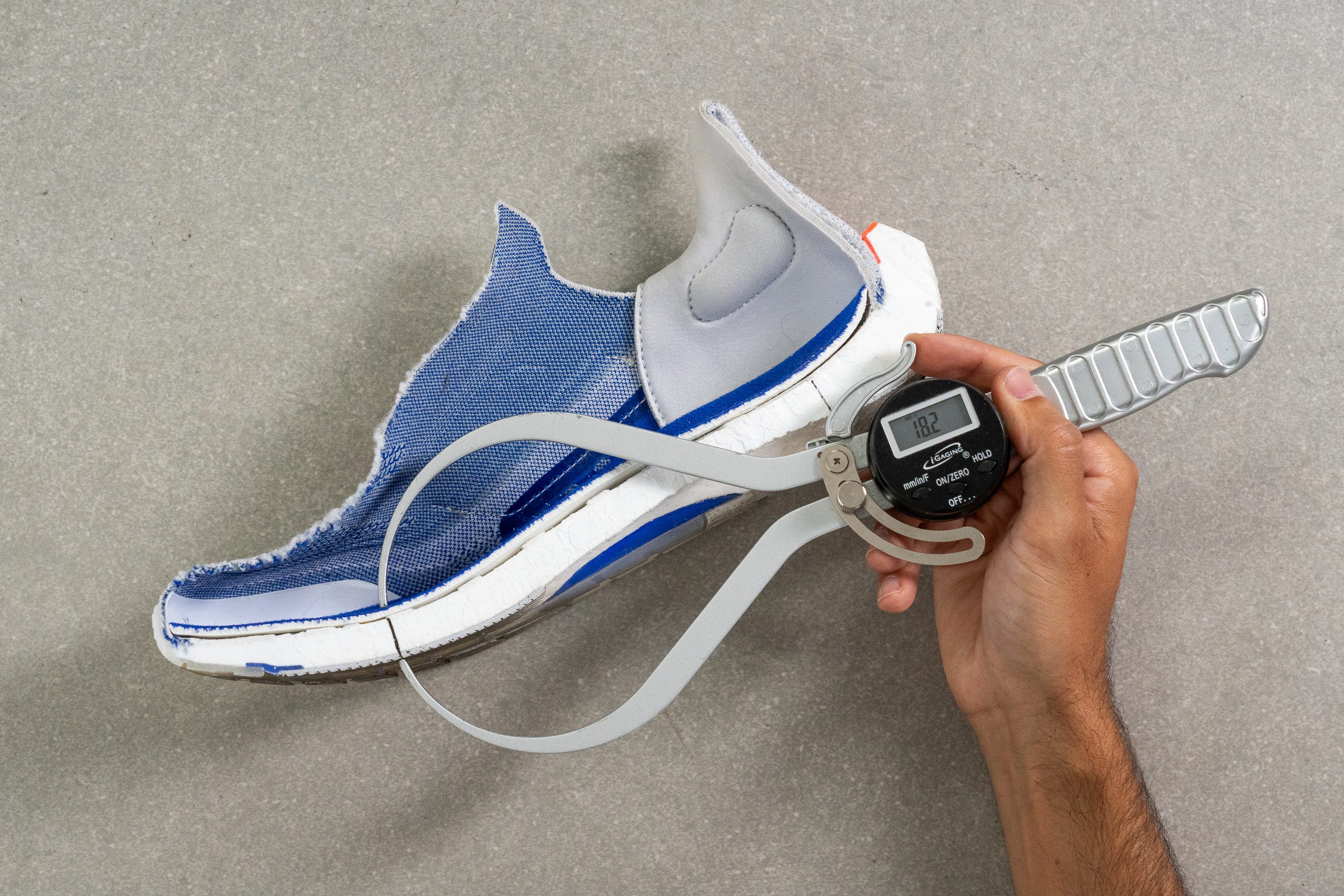
As the video below demonstrates, forefoot strikers won’t savor the cushioning of the shoe’s midsole as much as their heel striking counterparts. For a shoe that boasts more foam at the forefoot, we suggest checking out the ASICS Gel Nimbus 25 instead.
| Ultraboost Light | 18.2 mm |
| Average | 26.2 mm |
Drop
The difference in our two stack measurements leave us with a drop height of 11.9 mm, which classifies the Ultraboost Light as a high-drop shoe. This steep drop definitely favors runners with a heel striking stride as it promotes good heel-to-toe transitions.
It must be said that high drop shoes put more strain on our knees and hips which can increase the likelihood of injury, especially for forefoot strikers. Check out this helpful guide for more information that will help in choosing the right drop height.
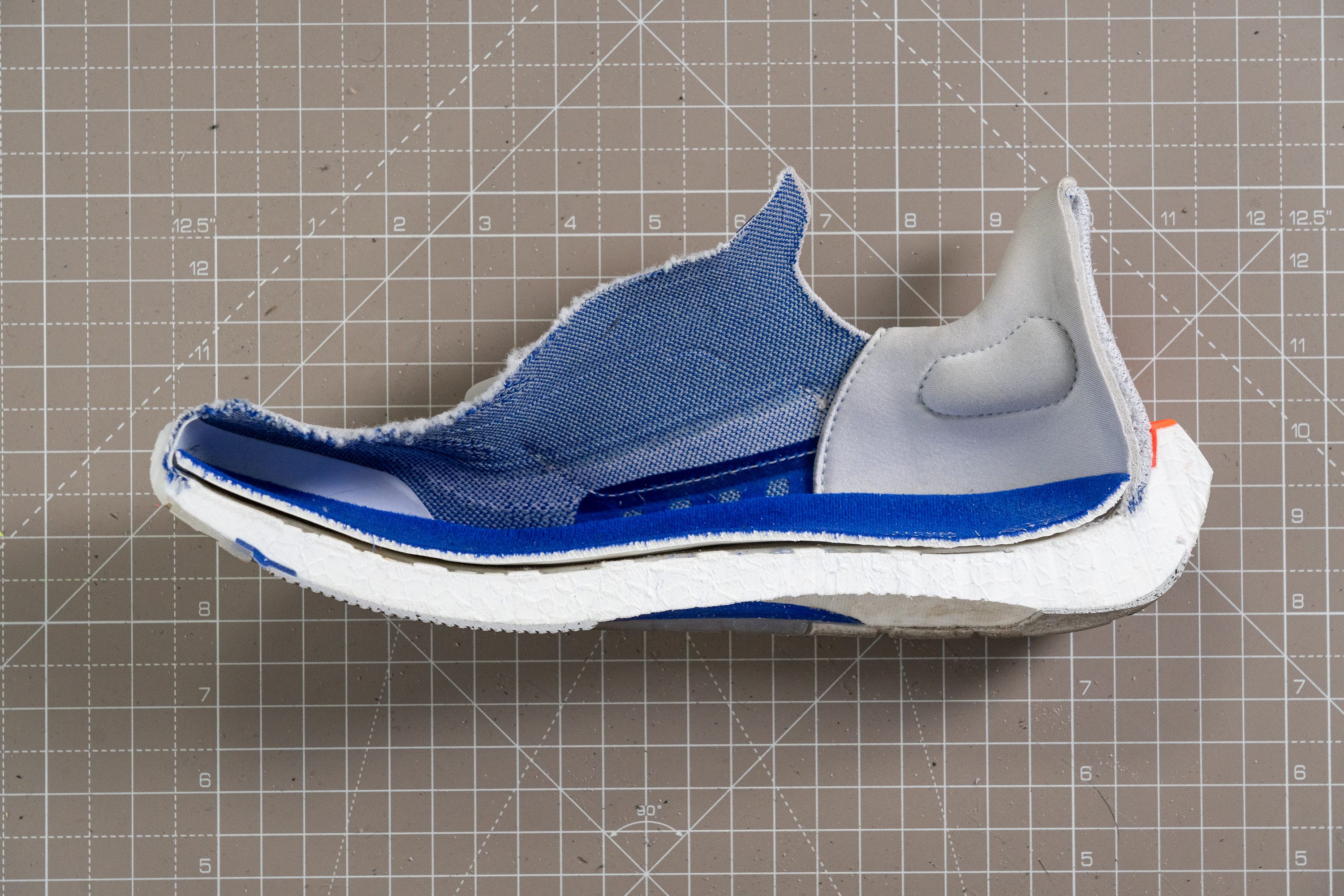
| Ultraboost Light | 11.9 mm |
| Average | 8.6 mm |
Midsole softness
The midsole of the Ultraboost light is decidedly plush. With a reading of 15.5 HA according to our durometer, the shoe’s midsole is much softer than our current lab average.
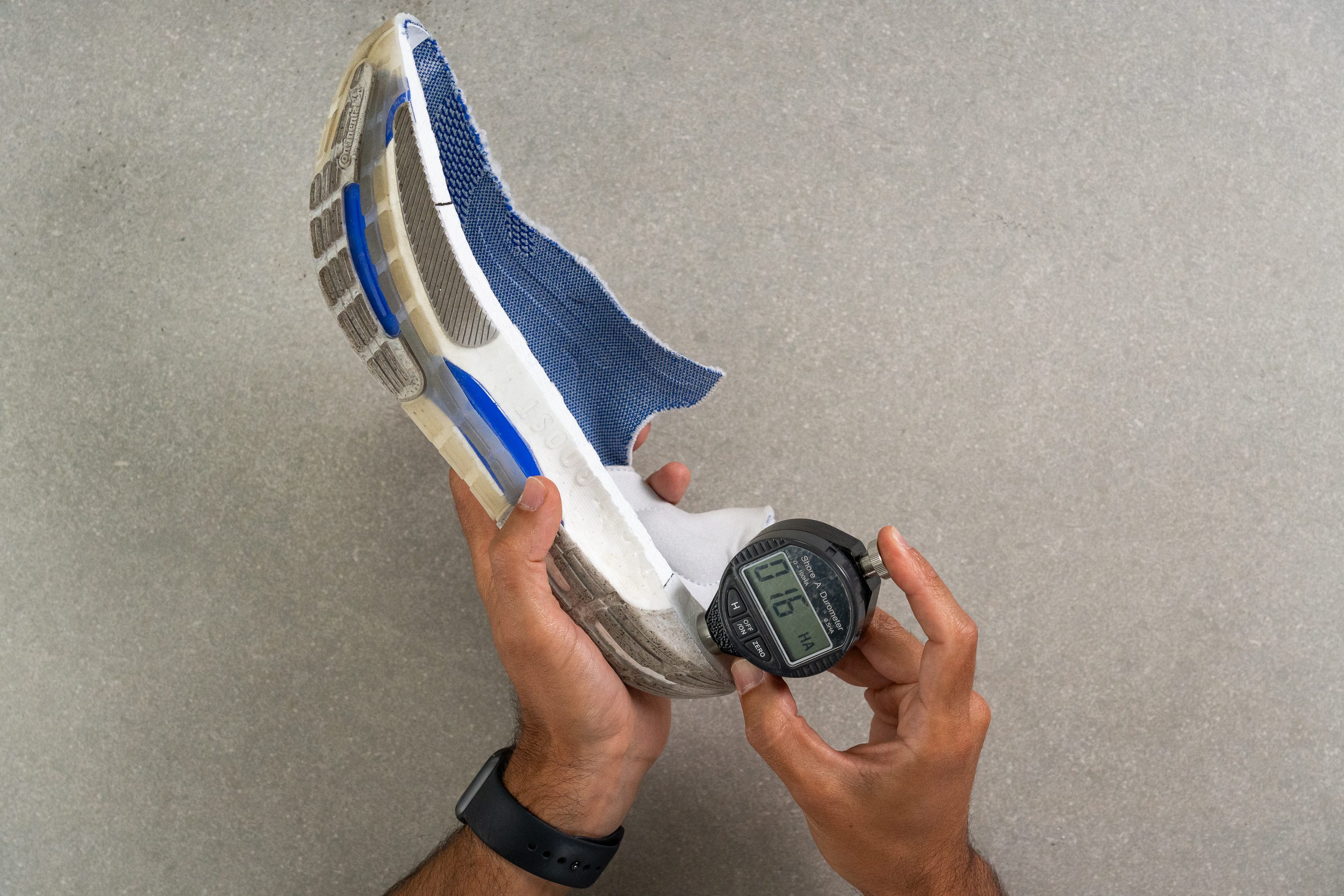
While this may be the case, the midsole has a lot of bounce to it and doesn’t bottom out when weight is applied to it, rather quickly springing back to shape. This means that the Ultraboost Light boasts a ride that is not only cushy and comfortable, but energy-efficient enough to support our long distance runs as well.
On the other hand, while it is possible to pick up the pace in this shoe; the sheer lack of foam at the forefoot meant that our toe-offs weren’t poppy enough to support tempo runs. For a daily shoe that’s more capable of high pace running, we recommend the Adidas Adizero SL which provides performance on a budget .
| Ultraboost Light | 15.5 HA |
| Average | 20.4 HA |
Size and fit
Size
Adidas Ultraboost Light fits half size small (76 votes).
Consider sizing up
Internal length
| Ultraboost Light | 270.5 mm |
| Average | 269.4 mm |
Width / Fit
We measured the mold at its widest point to be 96.4 mm, placing the UBL slightly above average in terms of width and offering more comfort for runners with average feet.
In our experience, the knit material also provides an adaptive fit that stretches significantly more than mesh uppers, creating a more accommodating experience than the measurement alone might suggest.
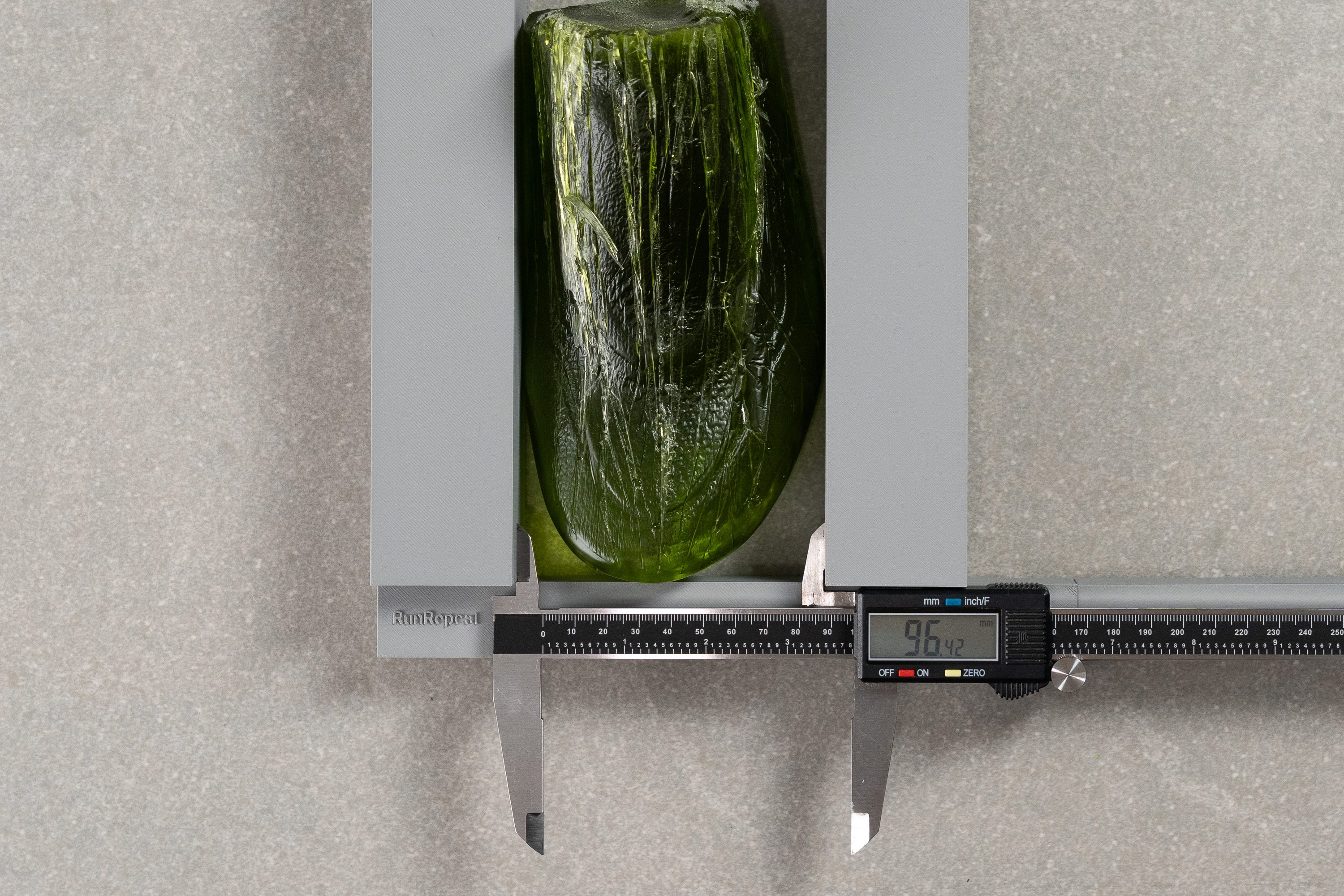
| Ultraboost Light | 96.4 mm |
| Average | 95.1 mm |
Toebox width
We tested the big toe area and measured it at 76.1 mm. We found that this roomier-than-usual measurement, combined with the knit upper, allowed our toes to splay naturally without any restriction.
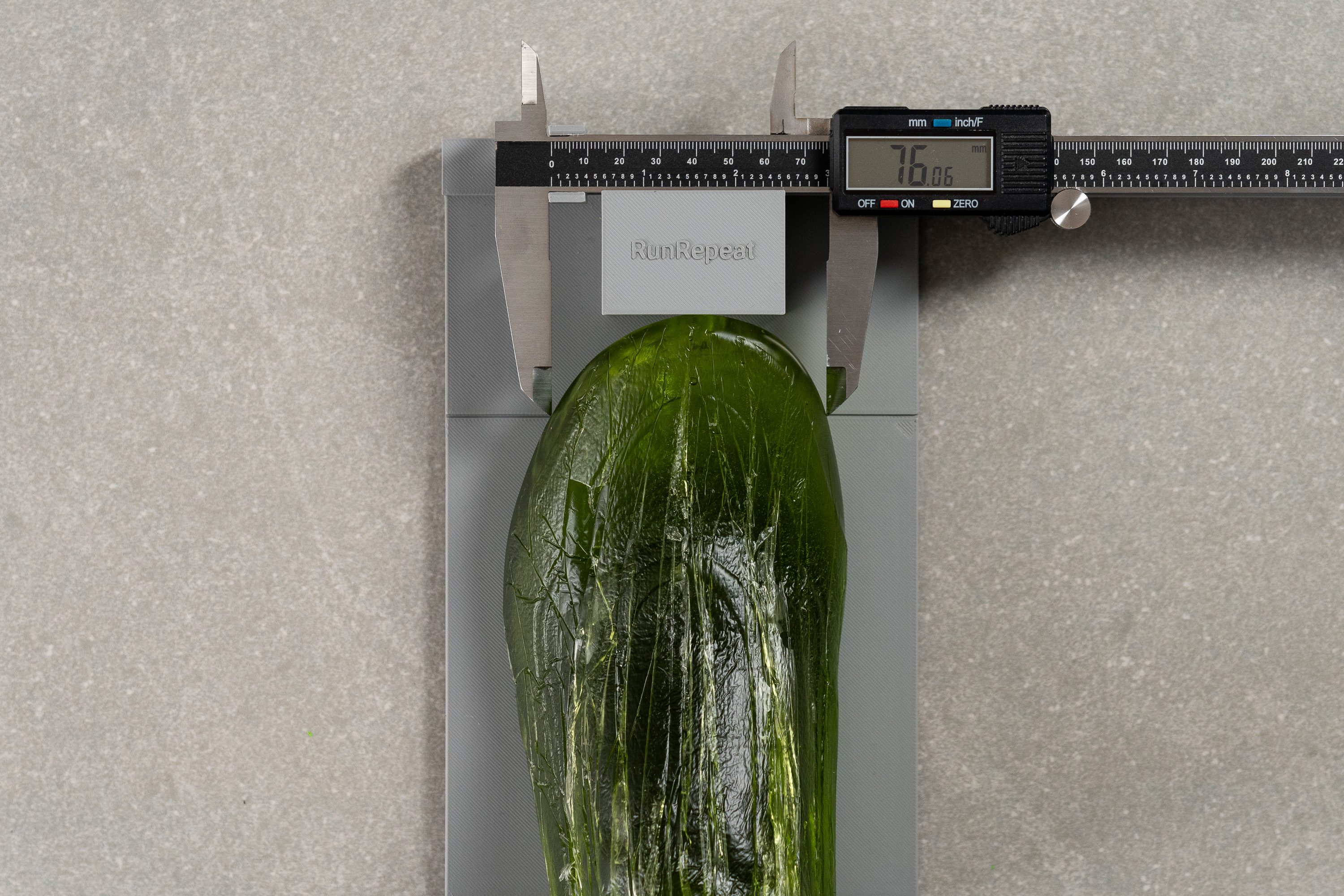
| Ultraboost Light | 76.1 mm |
| Average | 73.3 mm |
Toebox height
The fit comes with a catch—vertical room. At just 24.0 mm, the height feels quite limited and may cause pressure for some runners.
However, based on our findings, the highly-flexible knit upper helps compensate, reducing the likelihood of black toenails. Nonetheless, this shoe is not ideal for those who prefer a looser fit.
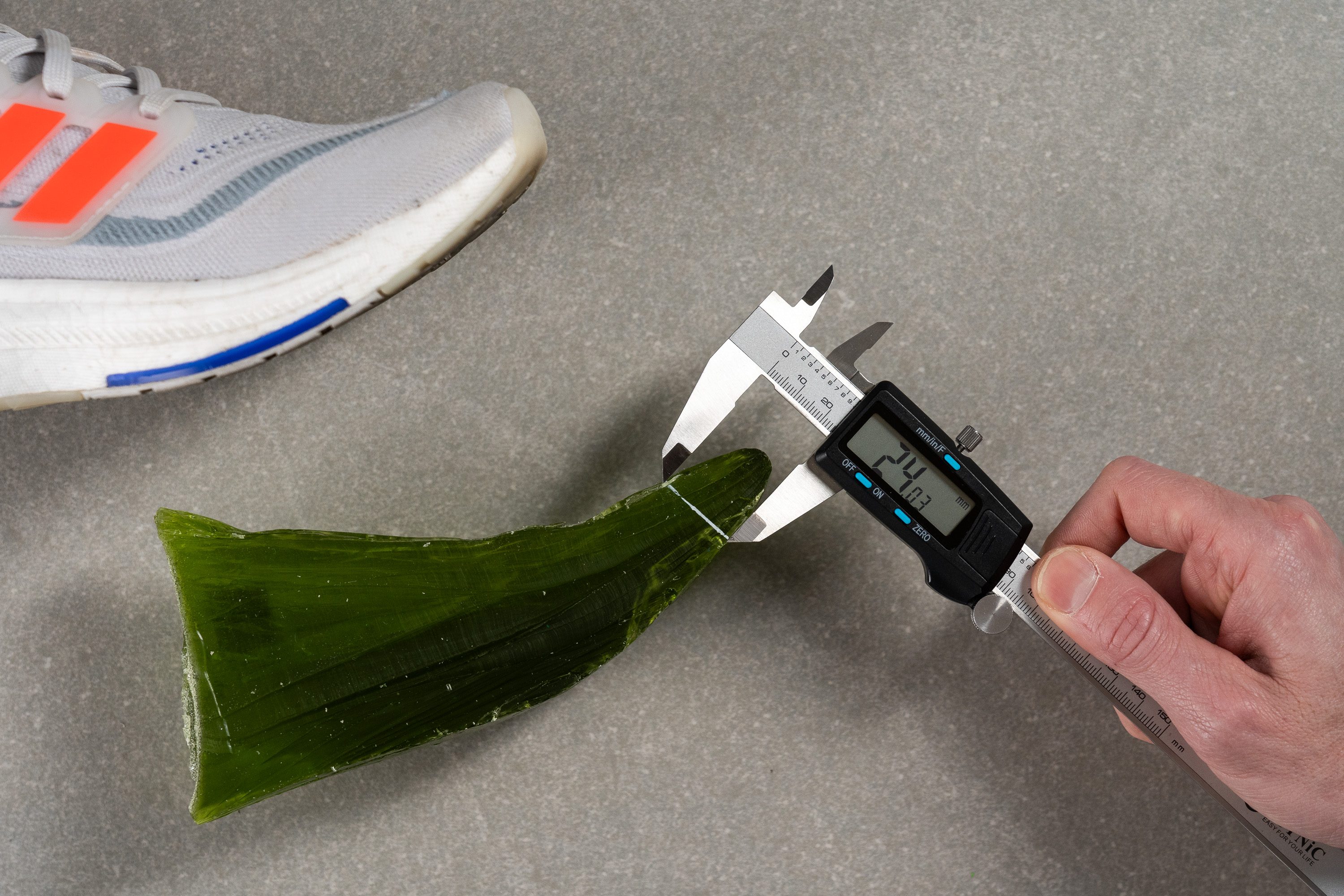
| Ultraboost Light | 24.0 mm |
| Average | 27.0 mm |
Traction / Grip
Traction test
The Ultraboost Light, staying true to its name, trimmed down the amount of Continental rubber to reduce weight. Still, this didn’t hurt traction much—we measured a respectable 0.46, delivering reliable grip on dry pavement, wet surfaces, and even light dirt roads.
| Ultraboost Light | 0.46 |
| Average | 0.49 |
Outsole design
The Ultraboost Light features a partially covered outsole that blends exposed Light Boost foam with translucent rubber strips. The rubber zones are mainly located in the forefoot and heel. A blue torsion plate sits beneath a central cutout, enhancing structure through the arch area.
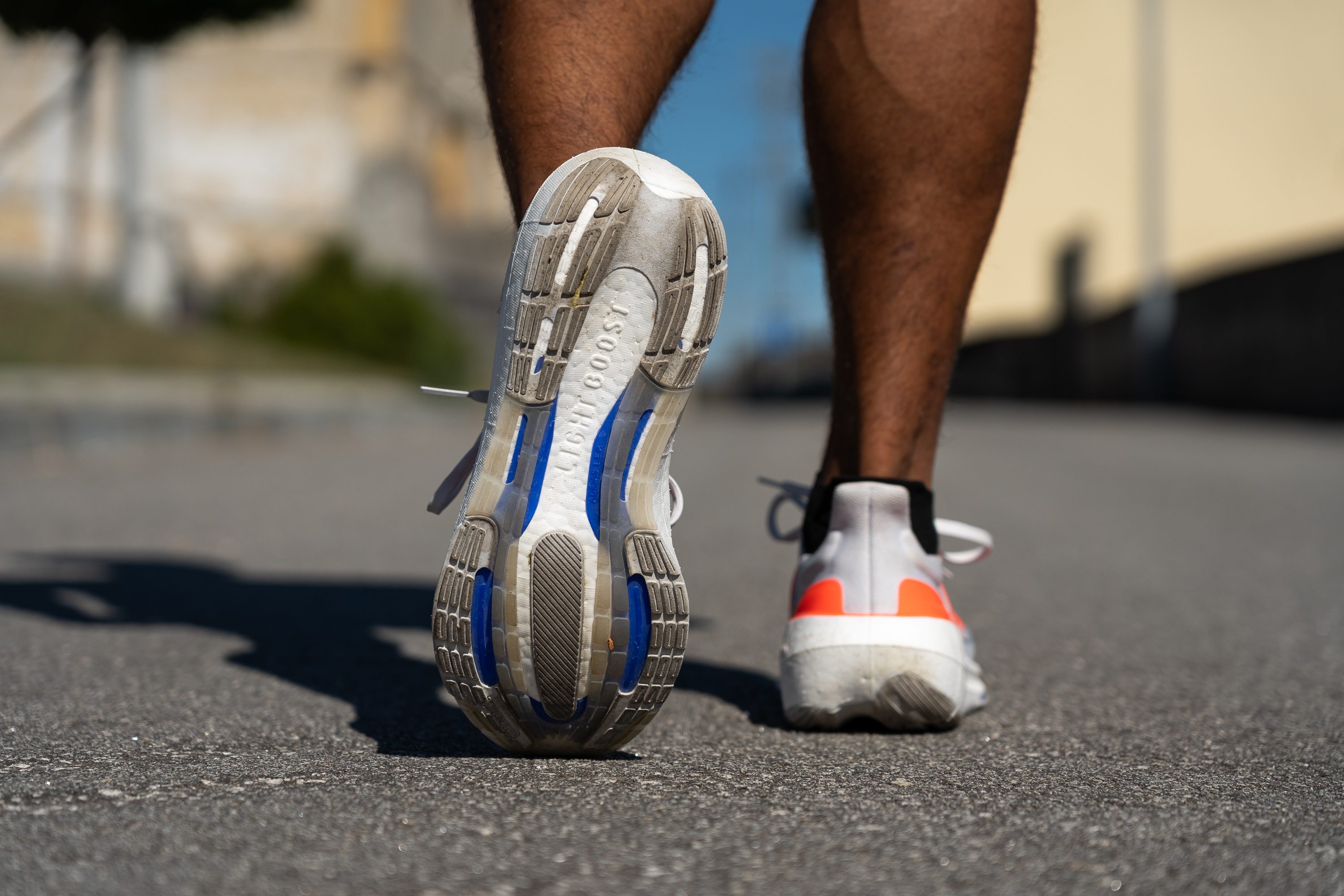
Flexibility / Stiffness
We test the flexibility of a shoe by securing it to our machine and measuring how much force is required to torque the shoe to 30-degrees. With a reading of only 11.3N the Ultraboost Light is less stiff than our current lab average.
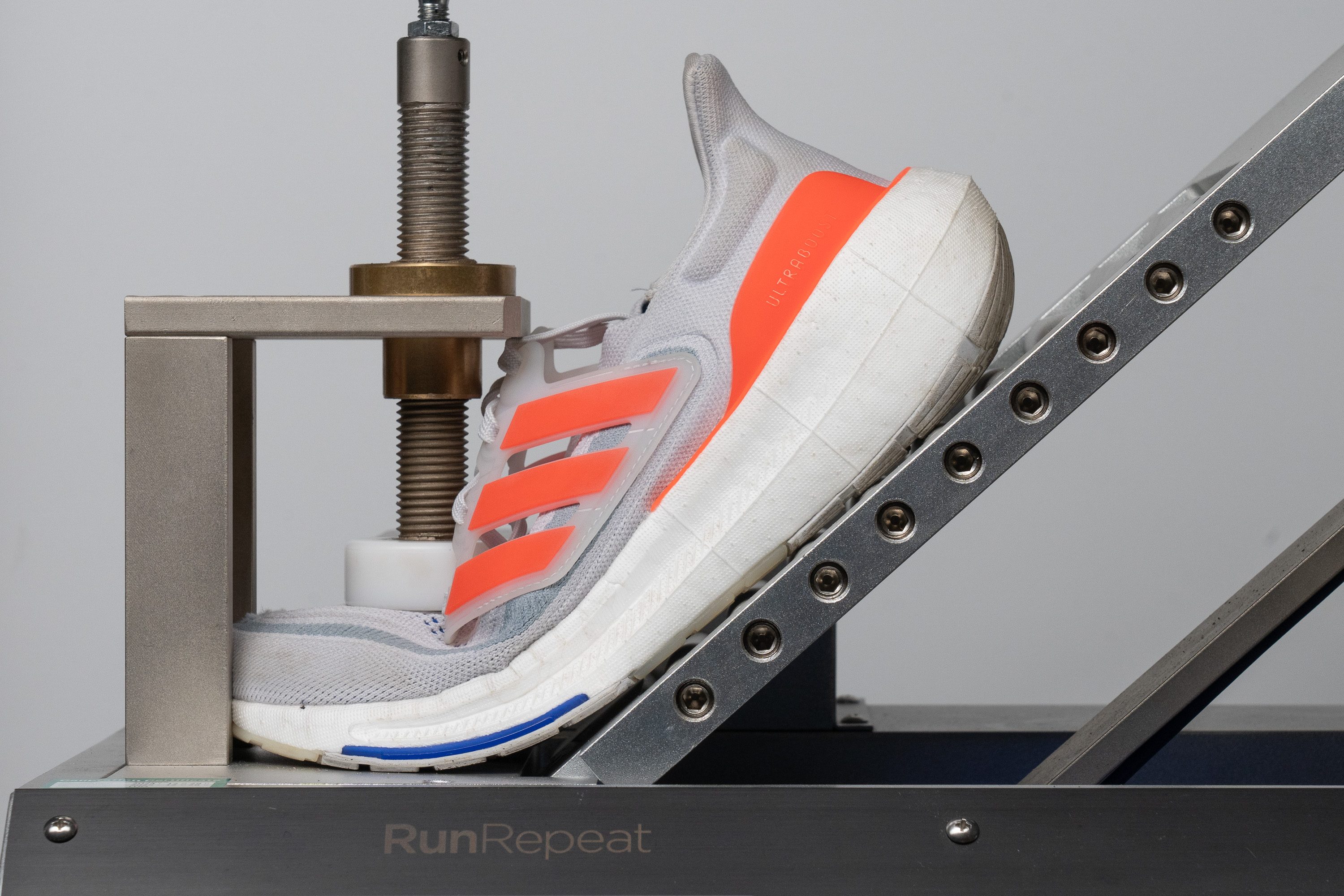
| Ultraboost Light | 11.3N |
| Average | 15.3N |
Stiffness in cold (%)
We repeated the stiffness test after leaving the Ultraboost Light in the freezer for twenty minutes and got a reading of 24.4N. This makes the Ultraboost much more flexible than our lab average under the same conditions, and means that the shoe will remain extremely pliable even during the frostiest winter runs.
These results mean that the Ultraboost Light only stiffens up by 31.3%, making it much more consistent than the average shoe between warm and cold conditions. To further contextualize just how remarkably flexible the Ultraboost Light is in the cold, it rivals the reading of a great bulk of shoes we’ve tested at room temperature!
| Ultraboost Light | 31% |
| Average | 33% |
Weight
While this may be its lightest iteration so far, tipping the scale at 10.75 Oz (305g), the Ultraboost Light simply isn’t as light as the name implies. The shoe is about as chunky as it looks and quite a bit heavier than our current lab average.
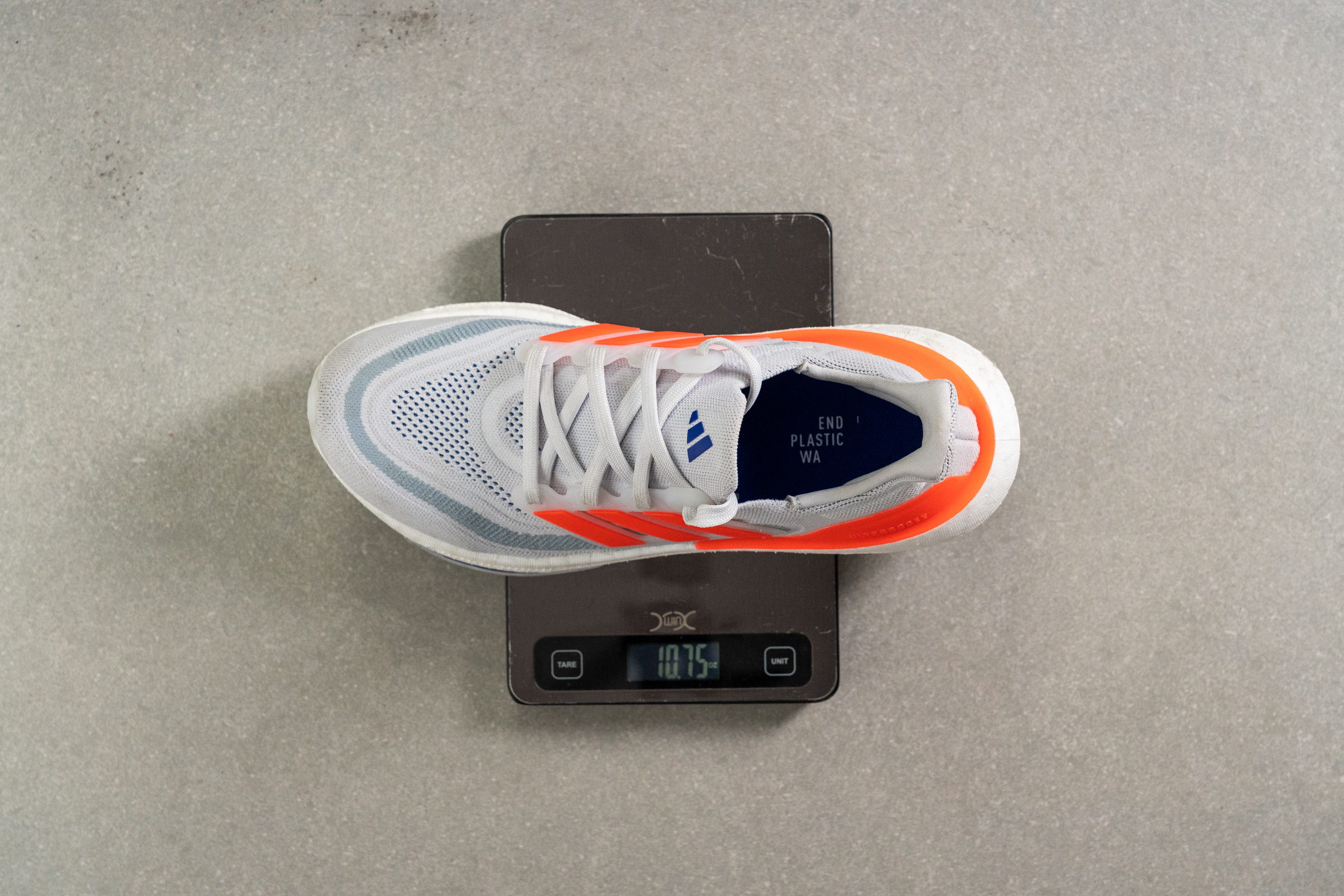
| Ultraboost Light | 10.8 oz (305g) |
| Average | 9.3 oz (264g) |
Breathability
To test how breathable the Ultraboost Light is we pump the shoe full of smoke and observe how it dissipates through its upper material. As you can see the smoke does manage to escape the shoe, though mostly through the sides and toebox while the tongue seems to trap it in. This leads us to give the shoe a breathability score of 3 out of 5.
Inspecting a backlit section of the upper gives us a better impression of how insulated the shoe is, with almost no light shining through any section of the shoe.
Our closeup shots of the Ultraboost Light also explain the shoe’s lackluster breathability. We can clearly see that the material that makes up the upper knit layer is thick and tightly braided, while the mesh that lies below is dense and not porous enough to allow heat to escape efficiently.
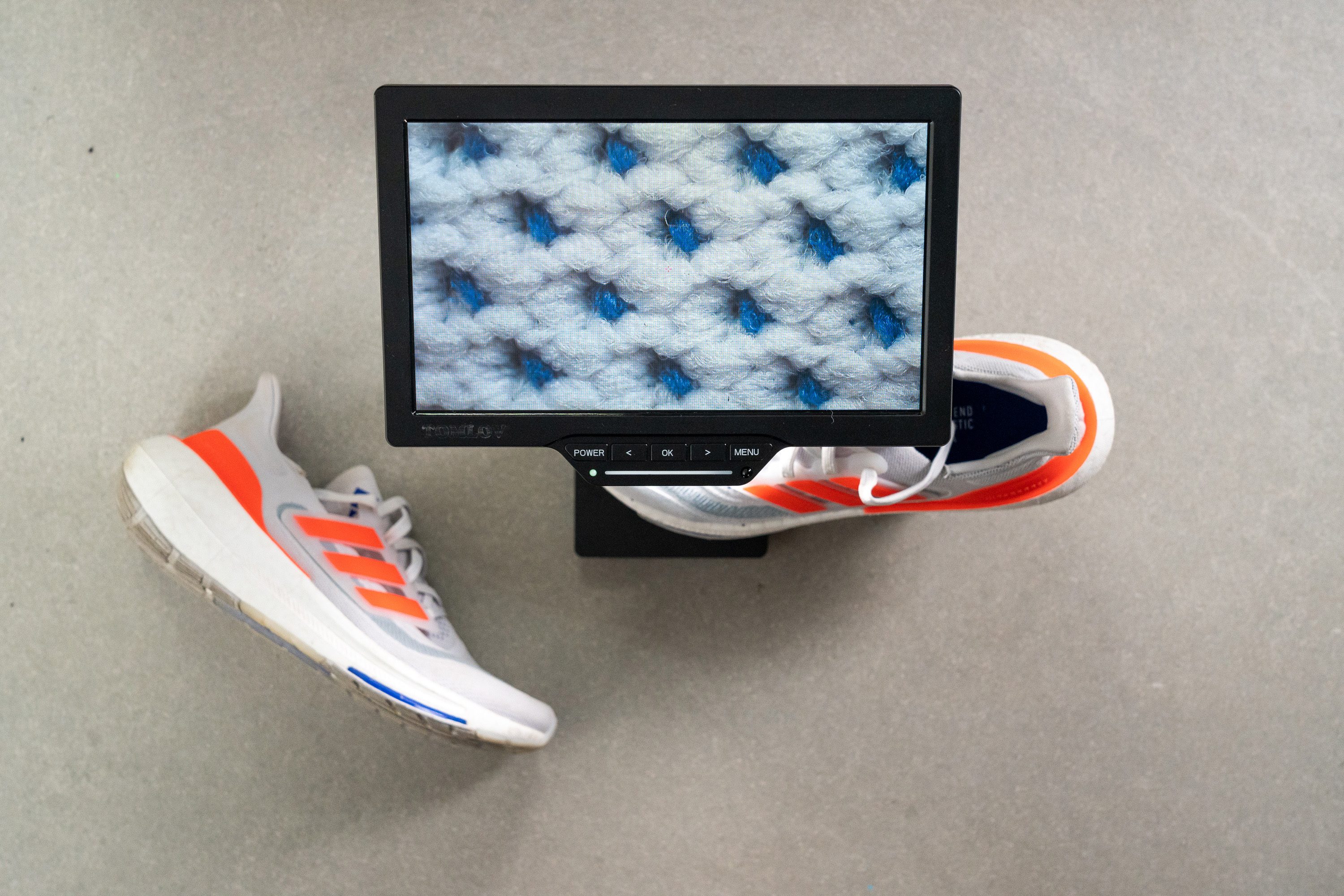
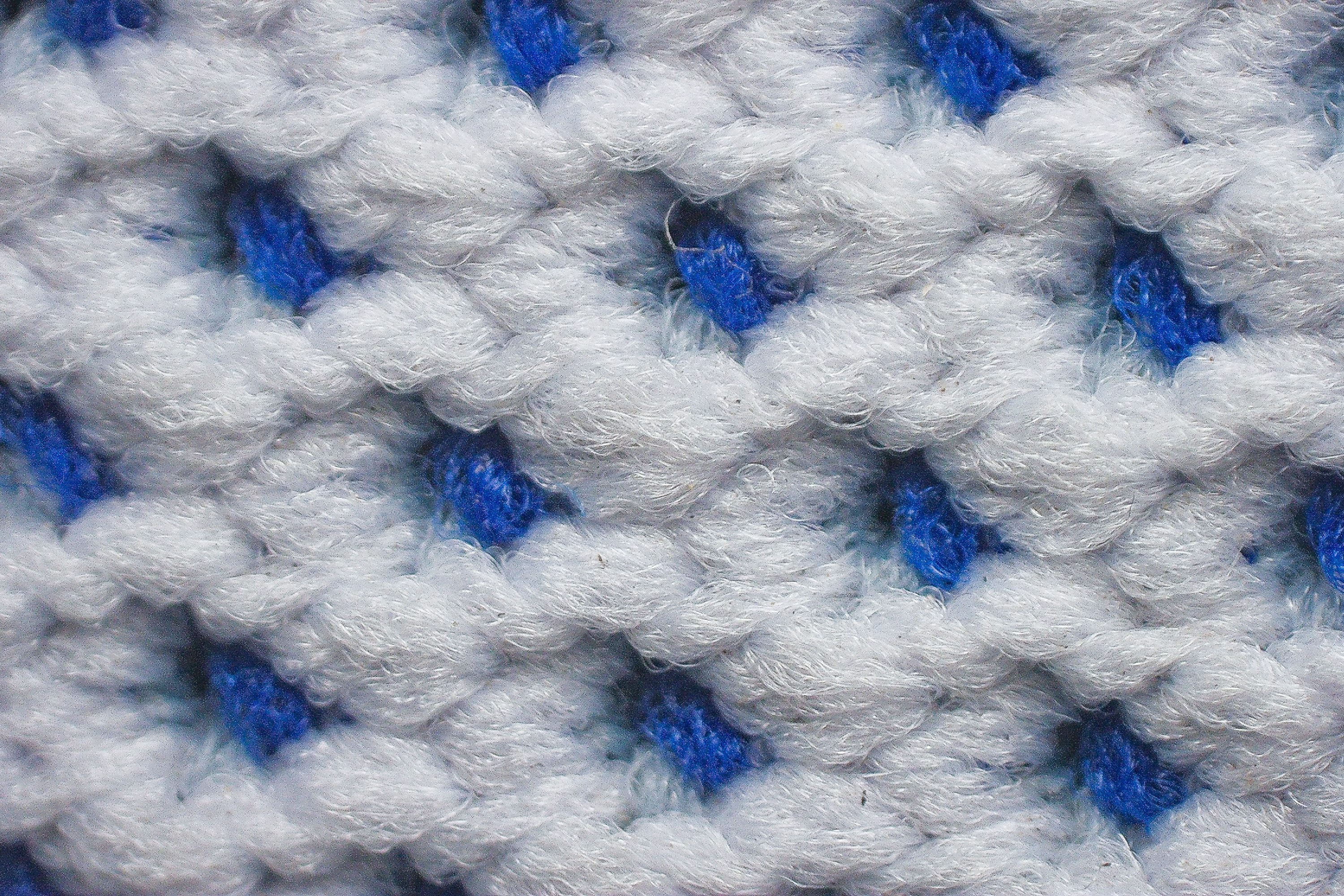
| Ultraboost Light | 3 |
| Average | 3.7 |
Stability
Lateral stability test
The Ultraboost Light feels incredibly stable underfoot. Shifting our weight from side to side, our feet felt well planted into the ground despite the shoe’s high heel stack.
Torsional rigidity
The Ultraboost Light put up a fair amount of resistance as we torqued and twisted it in our hands, giving the shoe a score of 3 out of 5 for torsional rigidity. This helps to offset any instability brought on by the high heel stack while still being flexible enough to adapt to the shape of our foot rather than forcing it in place.
| Ultraboost Light | 3 |
| Average | 3.5 |
Heel counter stiffness
The heel counter felt moderately stiff as we squeezed and manipulated it, giving it a score of 3 out of 5 on our subjective scale. This level of stiffness means that the shoe does a good job holding our heel in place and helps to prevent too much rolling from side to side.
| Ultraboost Light | 3 |
| Average | 2.9 |
Midsole width - forefoot
We measured the midsole with our caliper to be 117 mm wide at the forefoot. This is significantly wider than our current lab average, and gives us an extremely steady, if somewhat firm, platform to land on for forefoot strikers.
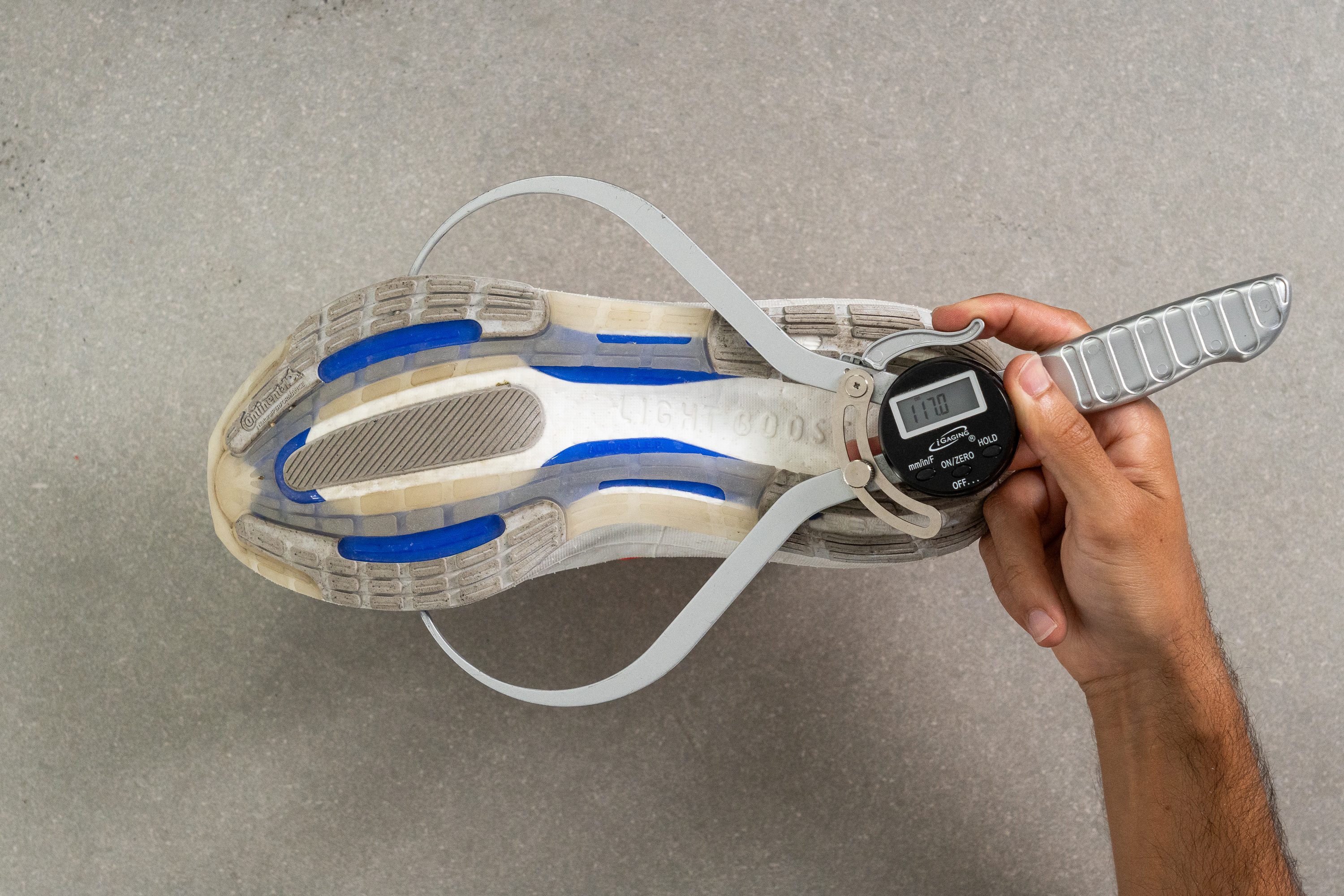
| Ultraboost Light | 117.0 mm |
| Average | 114.4 mm |
Midsole width - heel
The midsole is also wider than average at the heel, measuring 93.7 mm according to our caliper. This gives heel striking runners more than enough surface to ensure stable landings
The overall wide midsole of the Ultraboost light gives us an added sense of stability that is often lacking in high stacked shoes. This means that the shoe will also benefit runners with a slightly pronating stride.
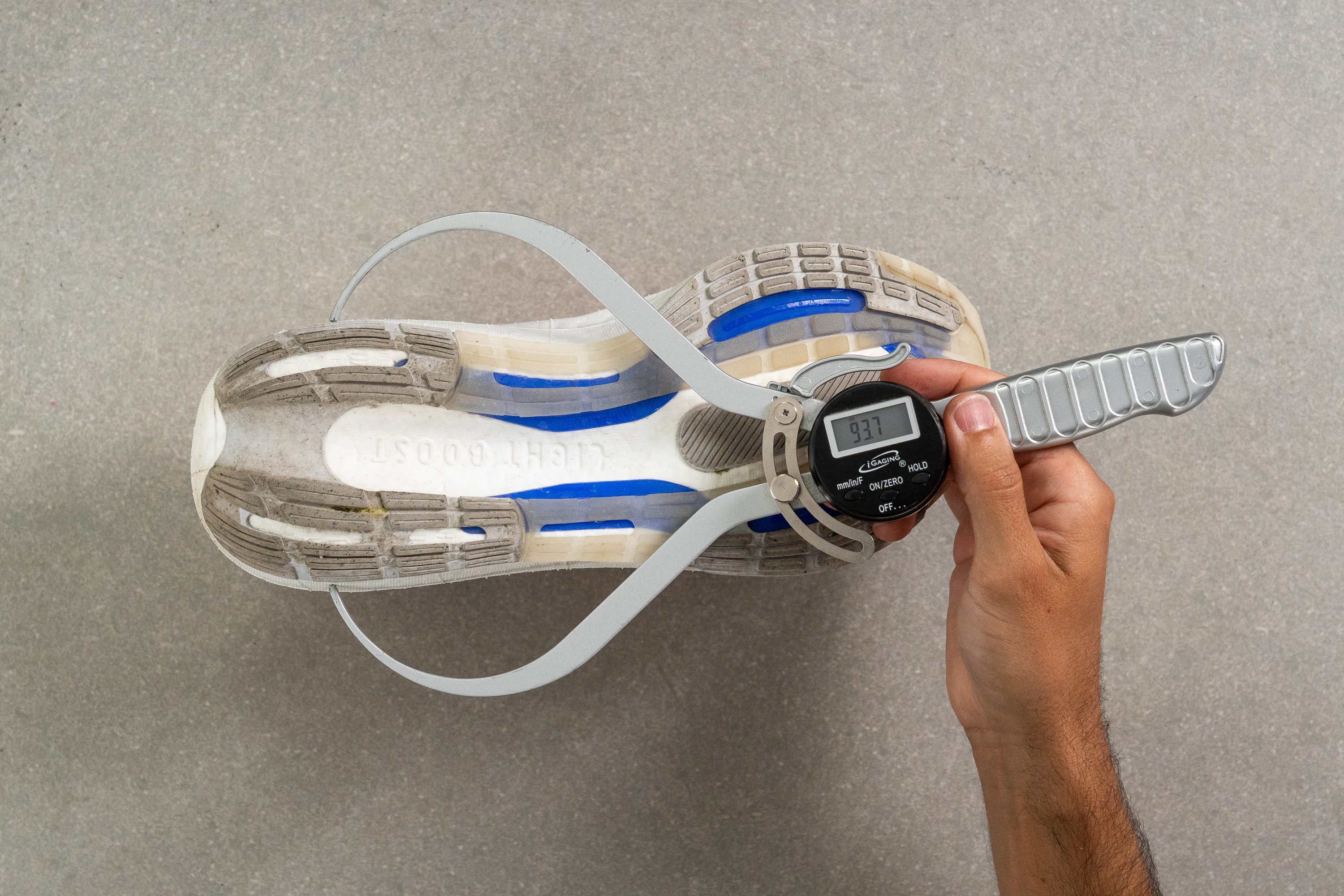
| Ultraboost Light | 93.7 mm |
| Average | 90.6 mm |
Durability
Toebox durability
We tested the durability of the Ultraboost Light’s toebox by applying our dremel to it with a force of 3.2N at 10K RPM for four seconds. While we were able to tear clean through the shoe’s knit upper, the mesh below remained relatively intact, which leads us to give the toebox a durability score of 4 out of 5.
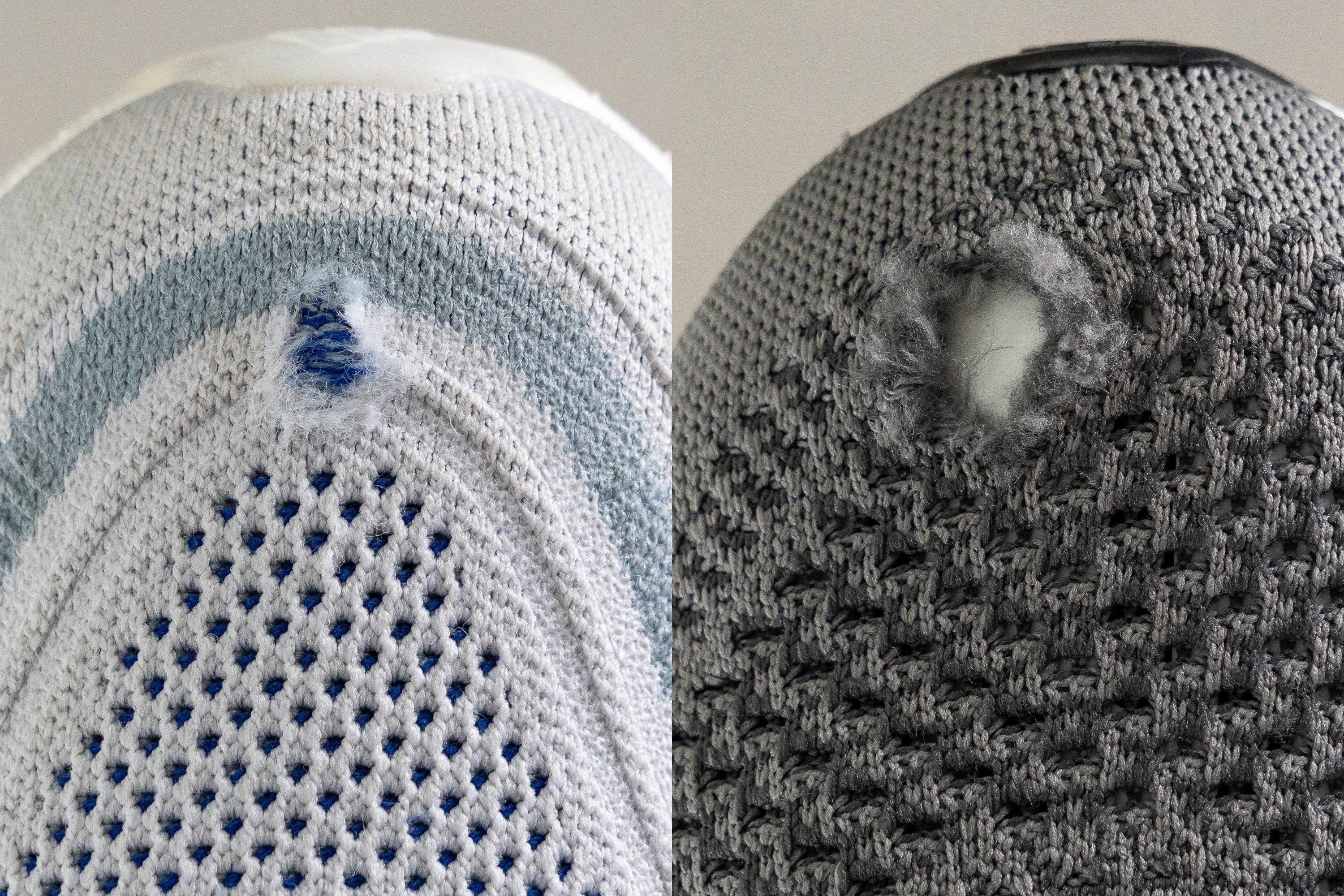
| Ultraboost Light | 4 |
| Average | 2.6 |
Heel padding durability
The Ultraboost Light’s heel counter proved to be an even more worthy contender against our dremel. After four seconds at the same parameters as the previous test, the dremel barely left an imprint on the shoe’s heel collar, leaving it looking about as it did before the test! We therefore score the shoe’s heel padding a perfect 5 out of 5. We can safely predict that the Ultraboost Light will still have most of its padding intact well beyond 500 miles of use.
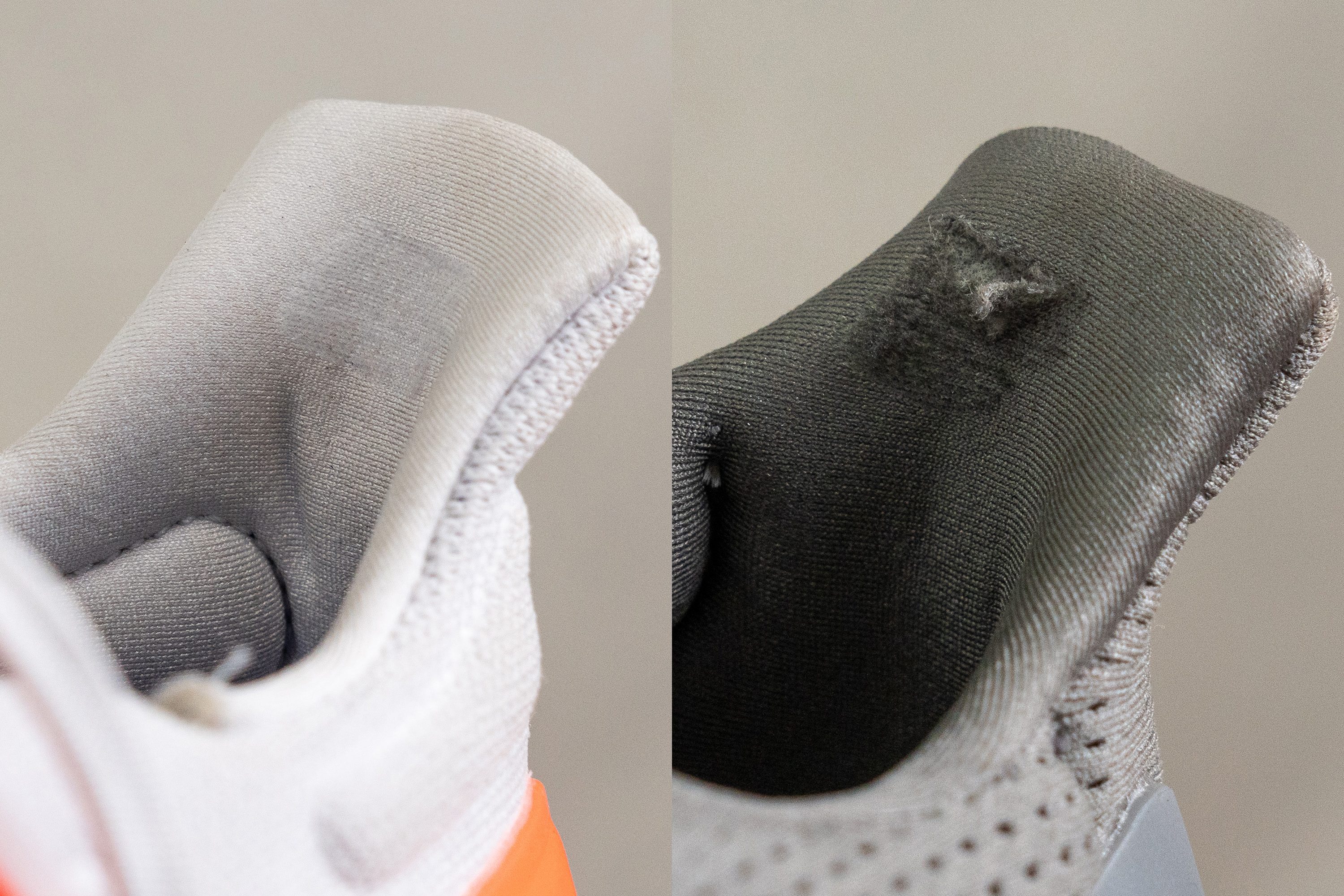
This is also an improvement from the original Ultraboost's heel collar.
| Ultraboost Light | 5 |
| Average | 3.4 |
Outsole hardness
We pressed our durometer against the outsole of the Ultraboost light to test how hard it is and got a reading of 76.8 HC.
This is slightly softer than our current lab average, but still in that sweet spot between hard and durable versus soft and grippy.
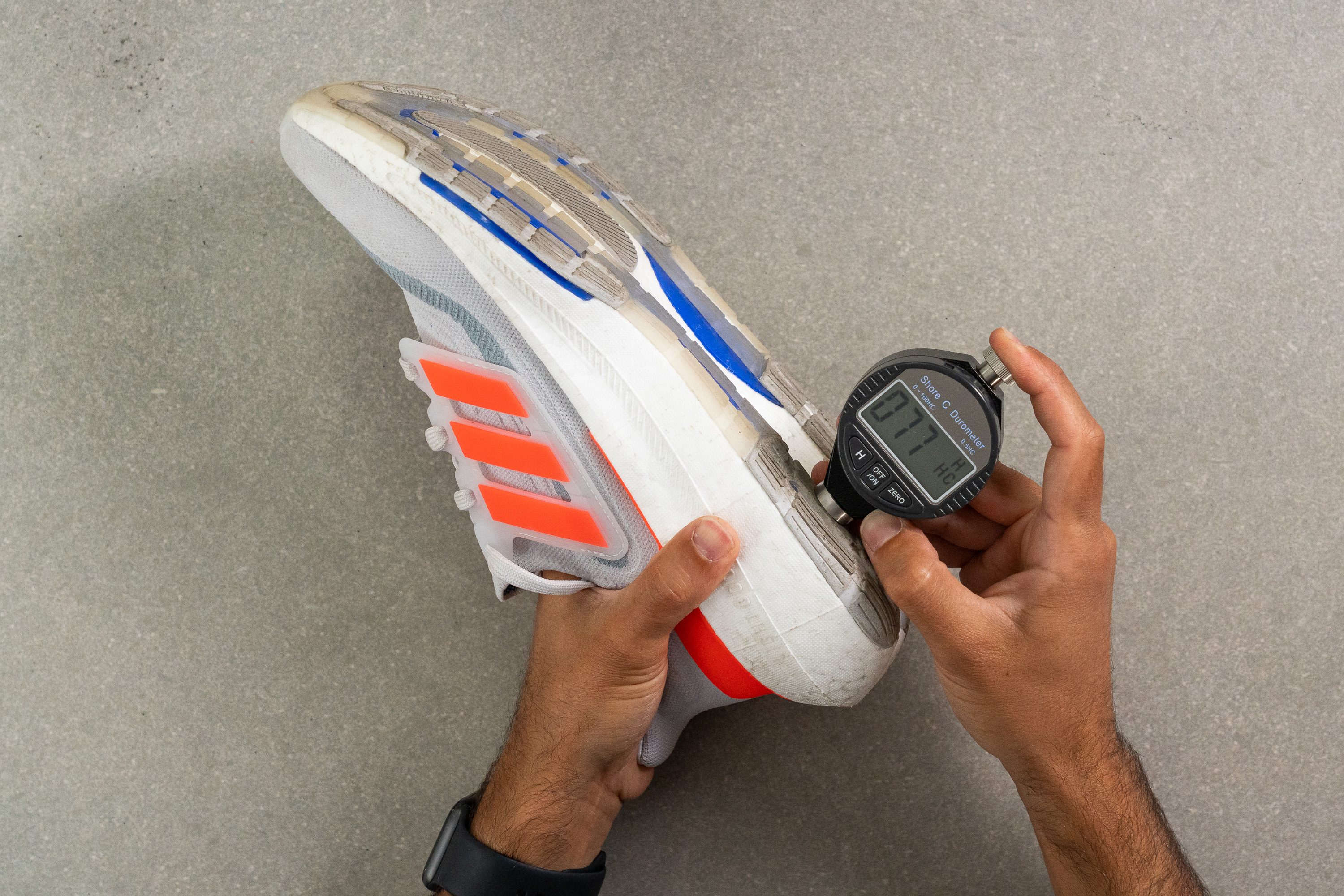
| Ultraboost Light | 76.8 HC |
| Average | 79.2 HC |
Outsole durability
To simulate extreme wear and tear over time, we once again fire up the dremel to 10K RPM and apply it to the shoe’s outsole with a force of 3.2N but for twenty seconds this time. The result of the visually anticlimactic test was a loss of only 0.71 mm of rubber. This makes the Ultraboost Light much more durable than average, and further supports our prediction regarding the longevity of this shoe.
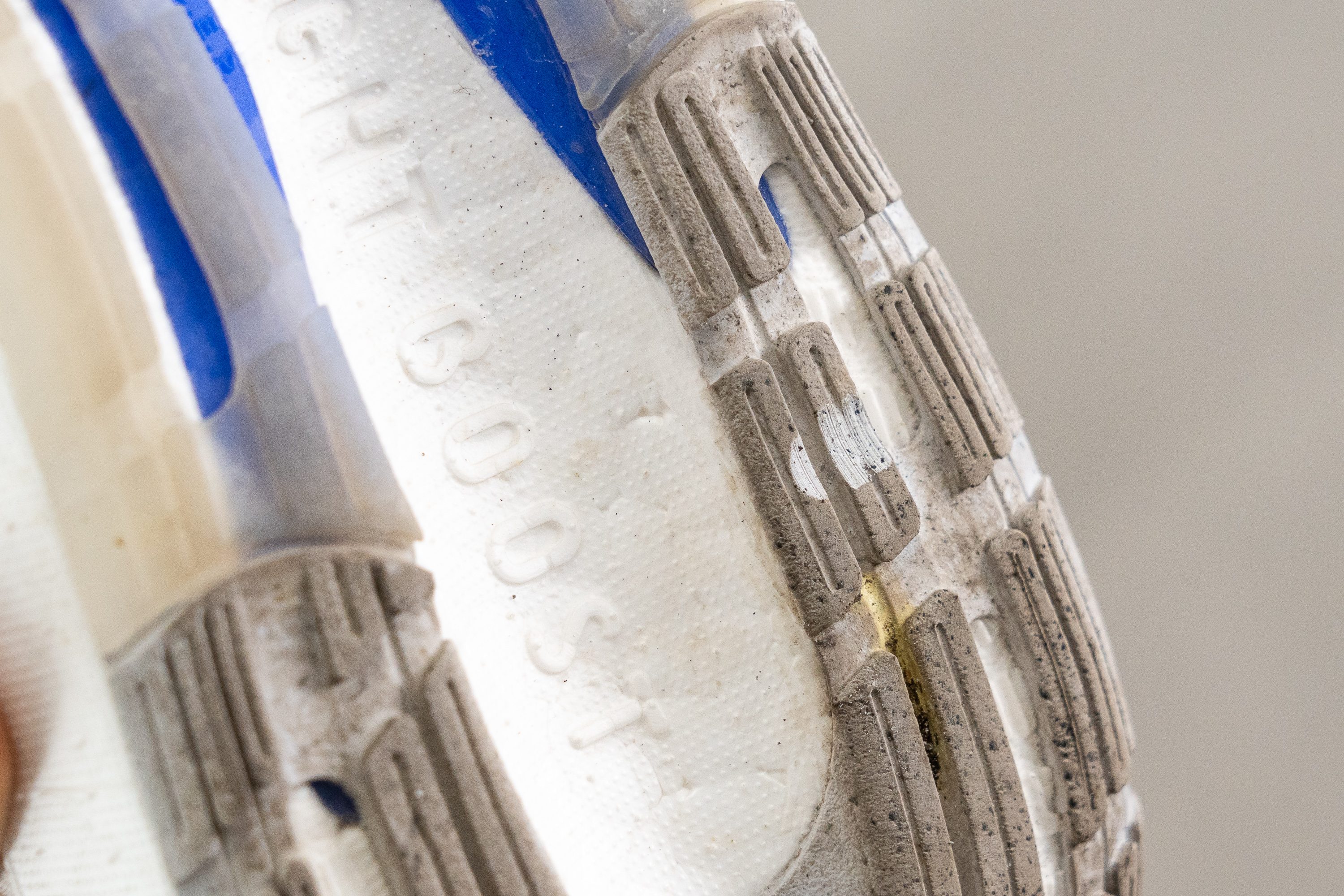
| Ultraboost Light | 0.7 mm |
| Average | 1.1 mm |
Outsole thickness
The shoe’s outsole is only 2.4 mm according to our caliper measurements, but, as the previous test demonstrates, the durability of the rubber means that this isn’t an issue as there was more than enough rubber left to run our dremel against it three more times.
By skimping on rubber in this instance, Adidas is able to keep some much needed weight off this already hefty shoe.
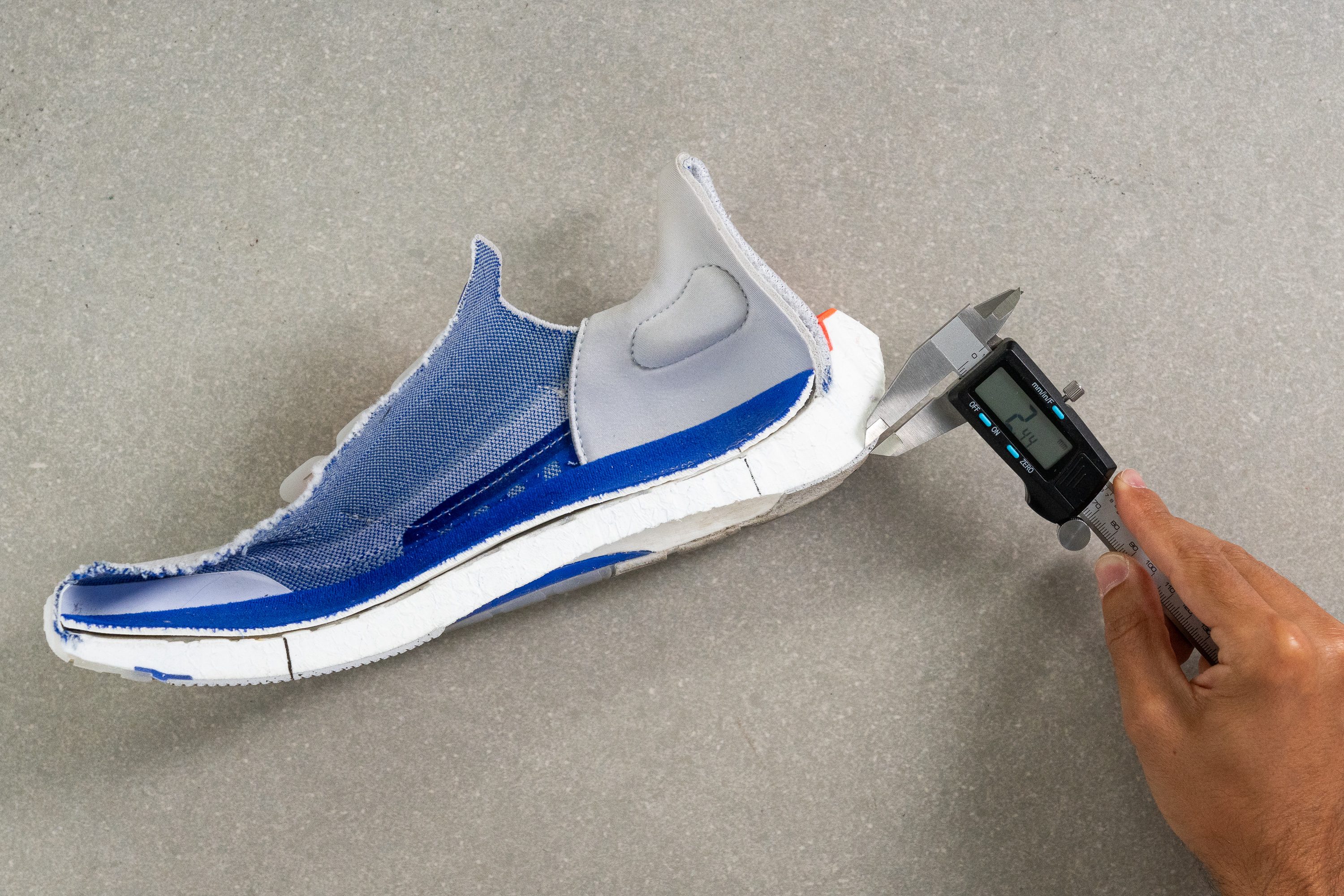
| Ultraboost Light | 2.4 mm |
| Average | 3.2 mm |
Misc
Insole thickness
We measured the insole of the Ultraboost Light at a meager 2.8 mm which is a fair bit thinner than our current lab average.
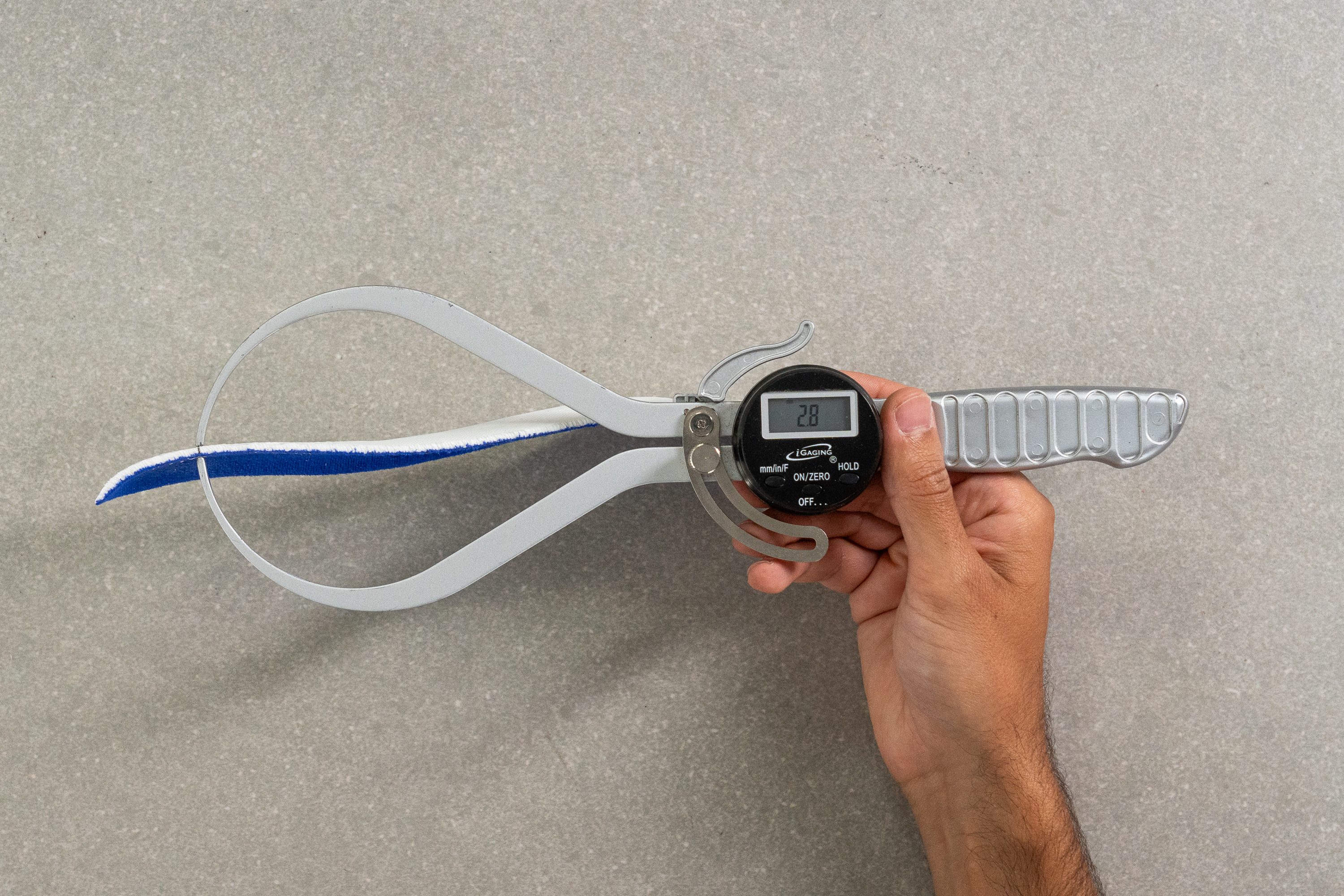
| Ultraboost Light | 2.8 mm |
| Average | 4.5 mm |
Removable insole
The insole of the Ultraboost Light is removable, making the shoe suitable for custom orthotics if needed.
| Ultraboost Light | Yes |
Midsole softness in cold (%)
We popped the Ultraboost Light in our freezer for twenty minutes to simulate exposure to cold weather and re-tested the shoe’s midsole with our durometer. With a reading of 19.8 HA, the Ultraboost light remains remarkably soft in the cold compared to the average shoe.
This, in conjunction with the shoe’s toasty upper, makes the Ultraboost Light a great choice for winter running of those living in colder climates as it remains cushy and plush no matter the weather.
While these results make the Ultraboost Light about as consistent as the average shoe under the same conditions, stiffening up by 27.4% in the cold; we must bear in mind that the shoe’s post-freezer midsole is still softer than the average midsole at room temperature!
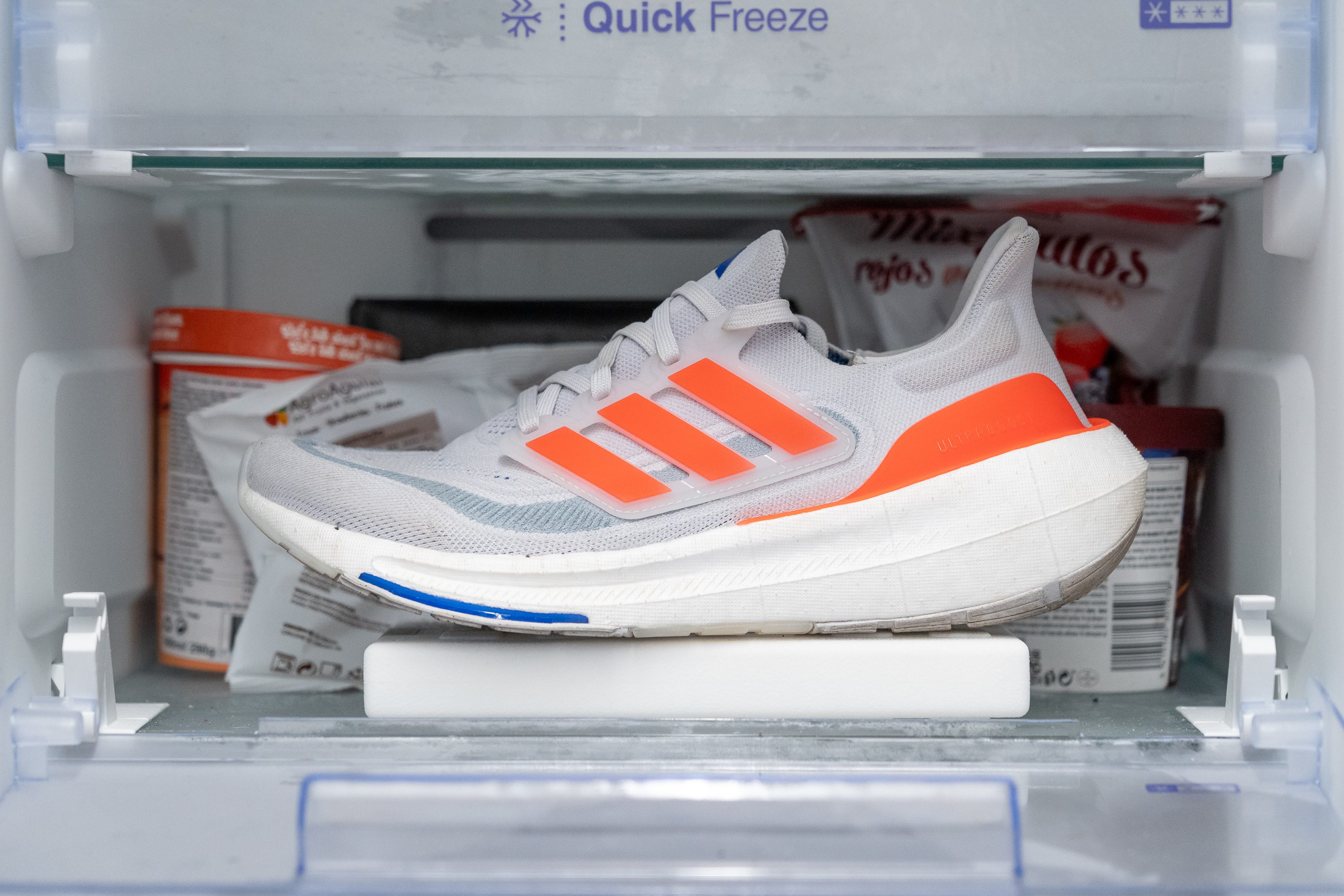
| Ultraboost Light | 27% |
| Average | 24% |
Reflective elements
With no reflective element whatsoever, the Ultraboost Light completely disappears in the dark. We therefore advise keeping to well-lit areas or taking the appropriate precautions when running at night.
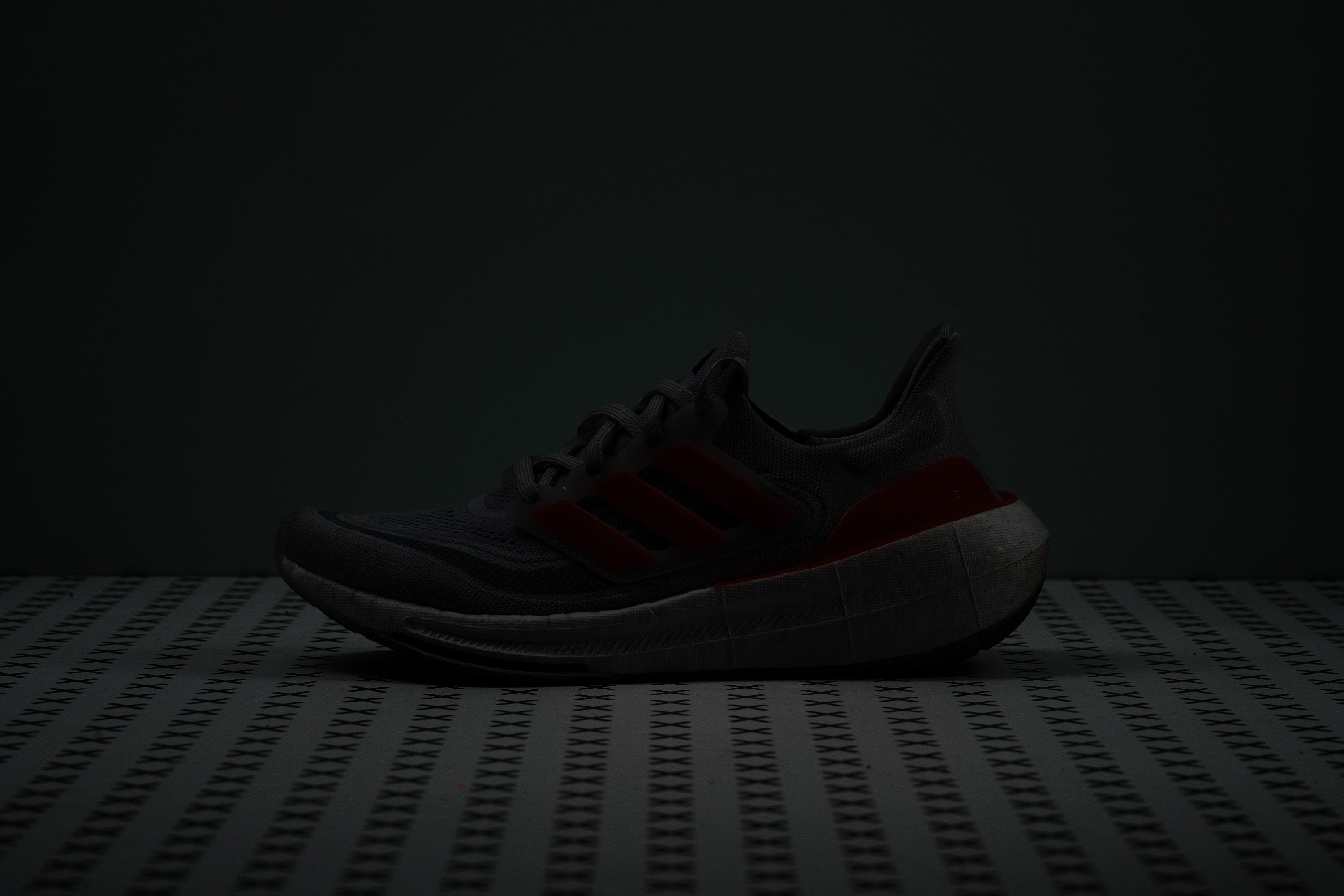
| Ultraboost Light | No |
Tongue padding
The padding in the tongue area of the shoe’s upper is only 1.3 mm thick based on our caliper measurements. While this is quite meager compared to our lab average, the plastic overlays adorned with the Adidas logo that hold the laces keep them from cinching down too tightly around the instep; so lace bite was never an issue during our test runs.
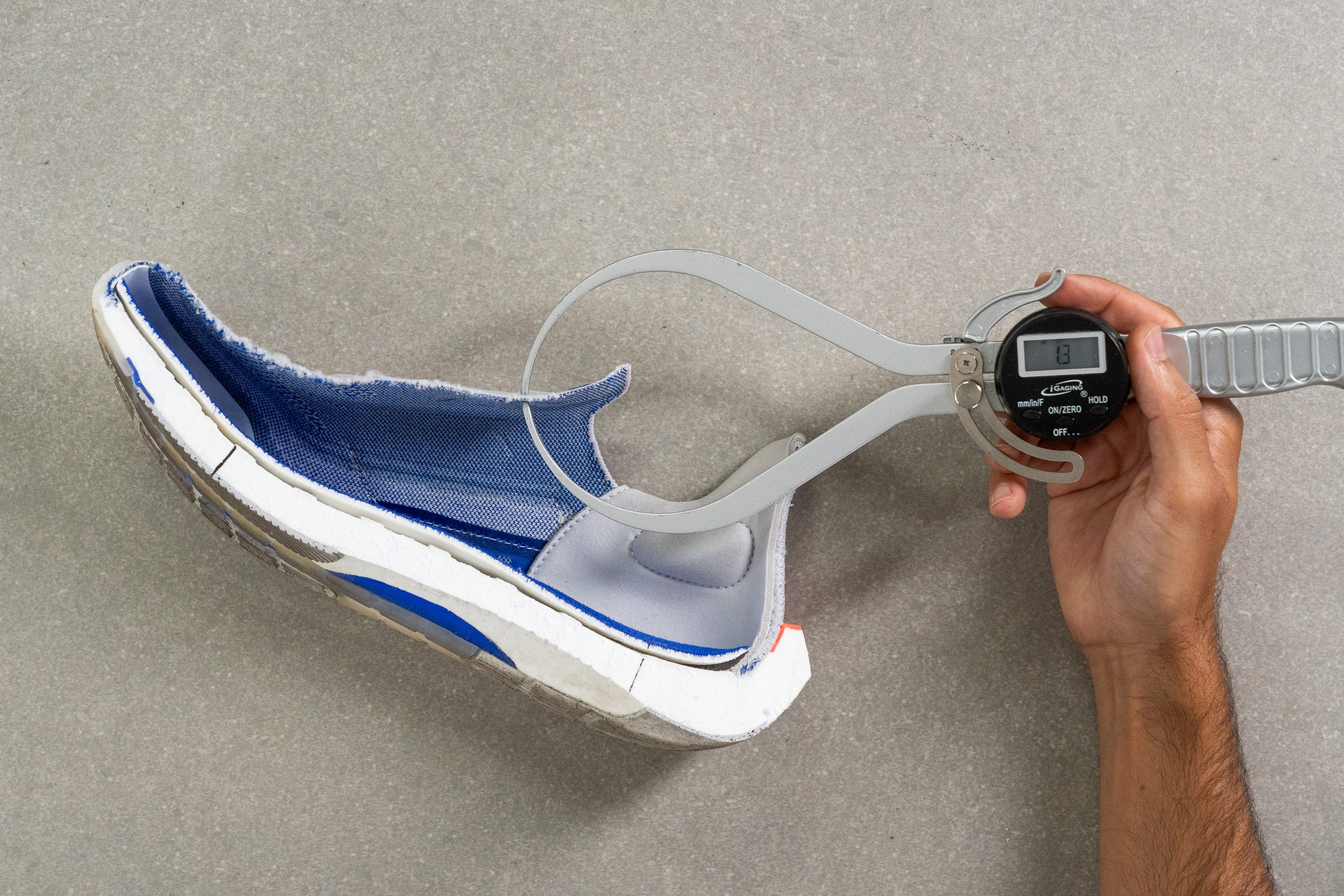
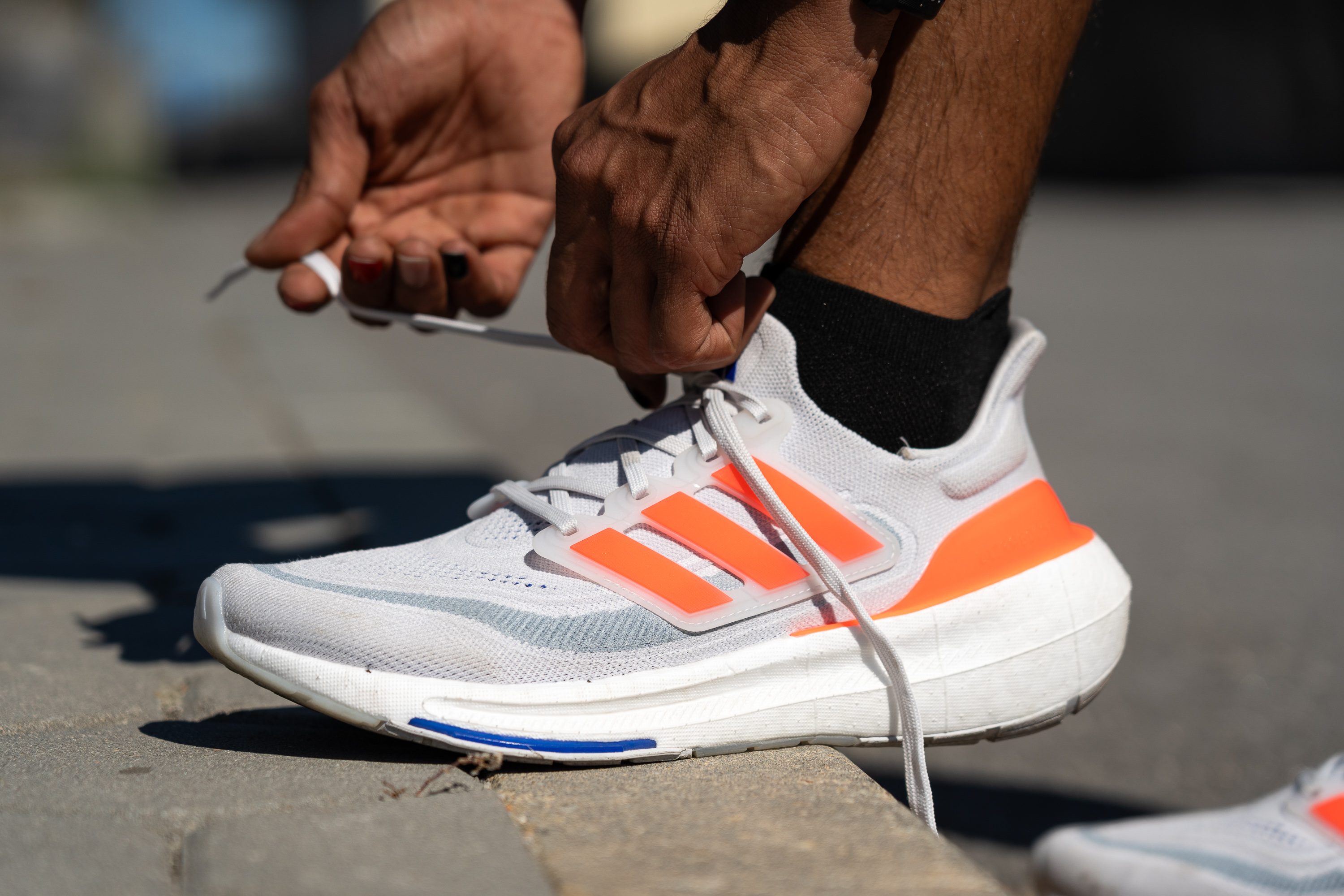
| Ultraboost Light | 1.3 mm |
| Average | 5.7 mm |
Tongue: gusset type
The Ultraboost Light is sock-like, which means that the tongue is an integral part of the upper with no separation from it. While this contributes to the shoe’s comfort, it’s not tight enough to provide adequate midfoot lockdown for tempo training.
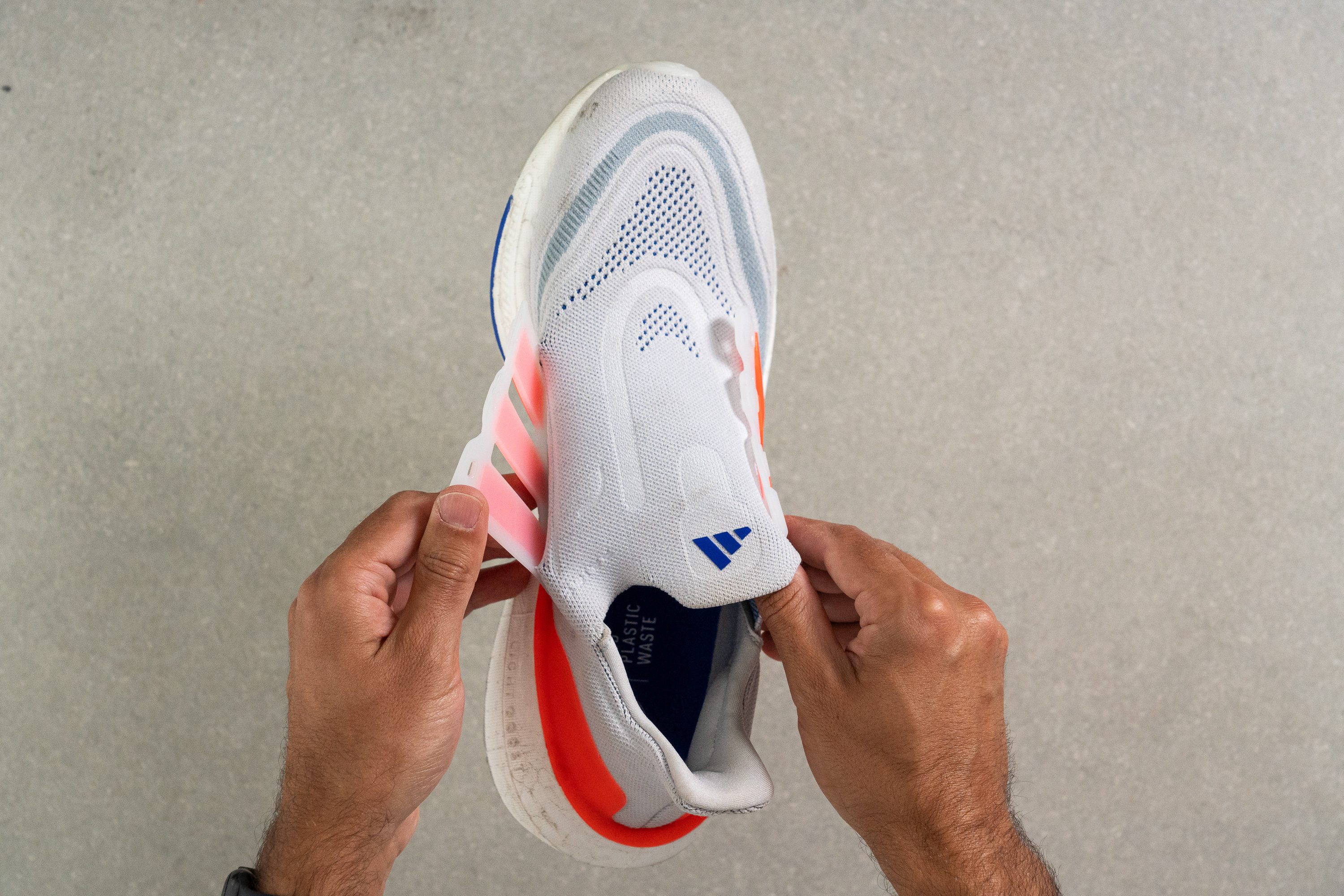
| Ultraboost Light | Sock like |
Heel tab
The Ultraboost Light doesn’t have any traditional heel loop to speak of; but the heel counter does extend slightly to form an elf ear tab that helps pull the shoe on, as well as providing some added support around in the rearfoot area.
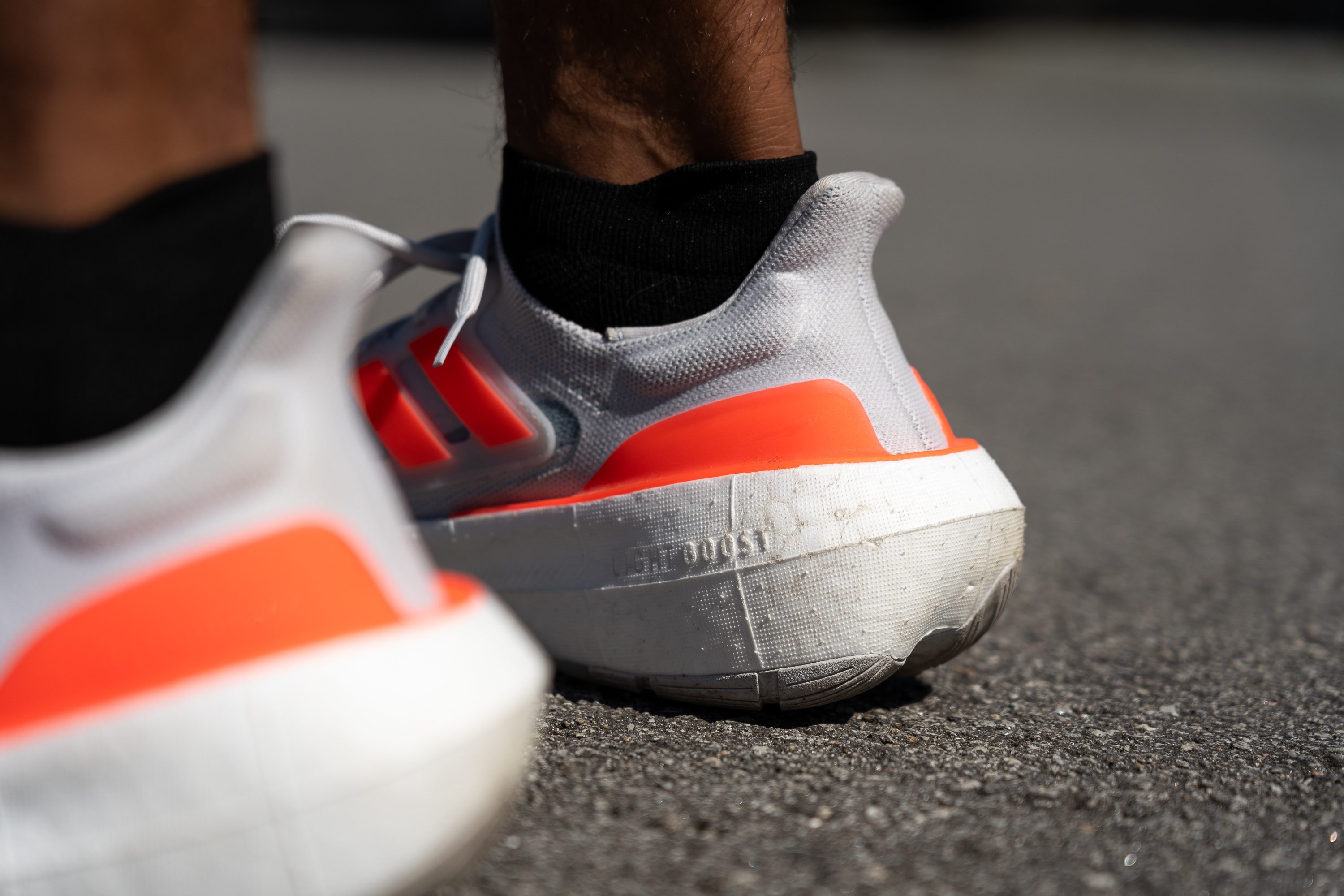
| Ultraboost Light | None |

